Linux设备驱动程序举例
Linux设备驱动程序原理及框架-内核模块入门篇
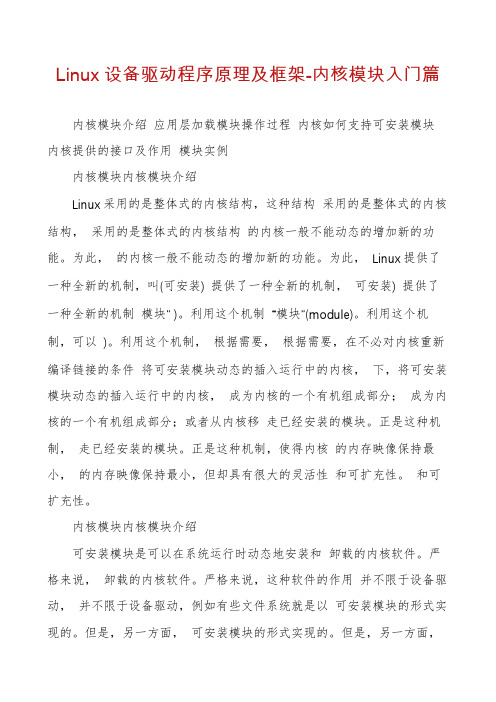
Linux设备驱动程序原理及框架-内核模块入门篇内核模块介绍应用层加载模块操作过程内核如何支持可安装模块内核提供的接口及作用模块实例内核模块内核模块介绍Linux采用的是整体式的内核结构,这种结构采用的是整体式的内核结构,采用的是整体式的内核结构的内核一般不能动态的增加新的功能。
为此,的内核一般不能动态的增加新的功能。
为此,Linux提供了一种全新的机制,叫(可安装) 提供了一种全新的机制,可安装) 提供了一种全新的机制模块” )。
利用这个机制“模块”(module)。
利用这个机制,可以)。
利用这个机制,根据需要,根据需要,在不必对内核重新编译链接的条件将可安装模块动态的插入运行中的内核,下,将可安装模块动态的插入运行中的内核,成为内核的一个有机组成部分;成为内核的一个有机组成部分;或者从内核移走已经安装的模块。
正是这种机制,走已经安装的模块。
正是这种机制,使得内核的内存映像保持最小,的内存映像保持最小,但却具有很大的灵活性和可扩充性。
和可扩充性。
内核模块内核模块介绍可安装模块是可以在系统运行时动态地安装和卸载的内核软件。
严格来说,卸载的内核软件。
严格来说,这种软件的作用并不限于设备驱动,并不限于设备驱动,例如有些文件系统就是以可安装模块的形式实现的。
但是,另一方面,可安装模块的形式实现的。
但是,另一方面,它主要用来实现设备驱动程序或者与设备驱动密切相关的部分(如文件系统等)。
密切相关的部分(如文件系统等)。
课程内容内核模块介绍应用层加载模块操作过程内核如何支持可安装模块内核提供的接口及作用模块实例内核模块应用层加载模块操作过程内核引导的过程中,会识别出所有已经安装的硬件设备,内核引导的过程中,会识别出所有已经安装的硬件设备,并且创建好该系统中的硬件设备的列表树:文件系统。
且创建好该系统中的硬件设备的列表树:/sys 文件系统。
(udev 服务就是通过读取该文件系统内容来创建必要的设备文件的。
)。
Linux下的硬件驱动——USB设备

Linux下的硬件驱动——USB设备什么是USB设备?USB即Universal Serial Bus,翻译过来就是通用串行总线。
它是一种规范化的、快速的、热插拔的串行输入/输出接口。
USB接口常被用于连接鼠标、键盘、打印机、扫描仪、音频设备、存储设备等外围设备。
Linux下的USB驱动在Linux系统中,每个USB设备都需要一个相应的驱动程序来驱动。
从Linux 2.4开始,内核提供了完整的USB设备支持。
对于每个USB设备,内核都会自动加载对应的驱动程序。
Linux下的USB设备驱动程序主要分为以下几个部分:USB核心驱动程序USB核心驱动程序是操作系统内核中处理USB设备的核心模块,负责与各种类型的USB设备进行通信,包括主机控制器、USB总线、USB设备等。
它与驱动程序和应用程序之间起到了桥梁的作用,为驱动程序提供了USB设备的基础支持。
USB设备驱动程序USB设备驱动程序是与特定USB设备相对应的驱动程序,为USB设备提供具体的读写功能和其他控制功能。
USB核心驱动程序和USB设备驱动程序之间的接口USB核心驱动程序和USB设备驱动程序之间的接口是指USB层和应用程序层之间的接口,负责传递各种USB操作的命令和数据。
如何编译一个USB设备驱动编译一个USB设备驱动程序需要按照以下步骤进行:步骤一:安装必要的软件包首先需要安装编译和调试USB设备驱动所需的软件包,包括编译工具链、内核源代码、内核头文件等。
sudo apt-get install build-essential linux-source linux-headers-`una me -r`步骤二:编写代码现在可以编写USB设备驱动程序的代码,此处不做详细介绍。
步骤三:编译代码在终端窗口中进入USB设备驱动程序所在的目录下,输入以下命令进行编译:make此命令将会编译USB设备驱动程序,并生成一个将驱动程序与内核进行连接的模块文件。
一、如何编写LinuxPCI驱动程序
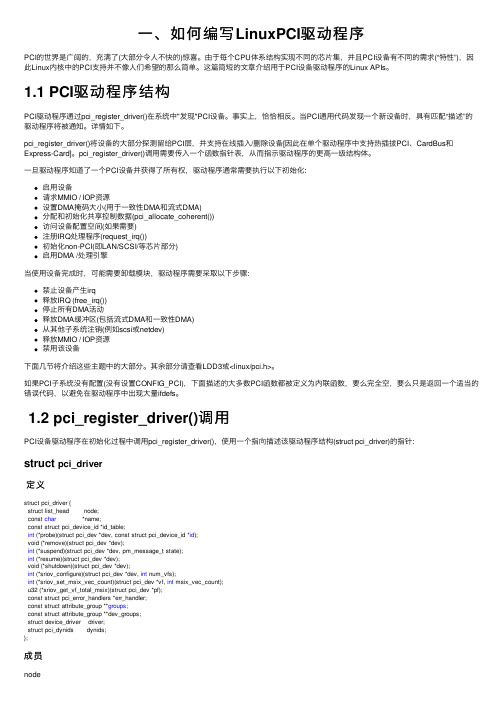
⼀、如何编写LinuxPCI驱动程序PCI的世界是⼴阔的,充满了(⼤部分令⼈不快的)惊喜。
由于每个CPU体系结构实现不同的芯⽚集,并且PCI设备有不同的需求(“特性”),因此Linux内核中的PCI⽀持并不像⼈们希望的那么简单。
这篇简短的⽂章介绍⽤于PCI设备驱动程序的Linux APIs。
1.1 PCI驱动程序结构PCI驱动程序通过pci_register_driver()在系统中"发现"PCI设备。
事实上,恰恰相反。
当PCI通⽤代码发现⼀个新设备时,具有匹配“描述”的驱动程序将被通知。
详情如下。
pci_register_driver()将设备的⼤部分探测留给PCI层,并⽀持在线插⼊/删除设备[因此在单个驱动程序中⽀持热插拔PCI、CardBus和Express-Card]。
pci_register_driver()调⽤需要传⼊⼀个函数指针表,从⽽指⽰驱动程序的更⾼⼀级结构体。
⼀旦驱动程序知道了⼀个PCI设备并获得了所有权,驱动程序通常需要执⾏以下初始化:启⽤设备请求MMIO / IOP资源设置DMA掩码⼤⼩(⽤于⼀致性DMA和流式DMA)分配和初始化共享控制数据(pci_allocate_coherent())访问设备配置空间(如果需要)注册IRQ处理程序(request_irq())初始化non-PCI(即LAN/SCSI/等芯⽚部分)启⽤DMA /处理引擎当使⽤设备完成时,可能需要卸载模块,驱动程序需要采取以下步骤:禁⽌设备产⽣irq释放IRQ (free_irq())停⽌所有DMA活动释放DMA缓冲区(包括流式DMA和⼀致性DMA)从其他⼦系统注销(例如scsi或netdev)释放MMIO / IOP资源禁⽤该设备下⾯⼏节将介绍这些主题中的⼤部分。
其余部分请查看LDD3或<linux/pci.h>。
如果PCI⼦系统没有配置(没有设置CONFIG_PCI),下⾯描述的⼤多数PCI函数都被定义为内联函数,要么完全空,要么只是返回⼀个适当的错误代码,以避免在驱动程序中出现⼤量ifdefs。
Linux视频设备驱动编程(v4l2编程)
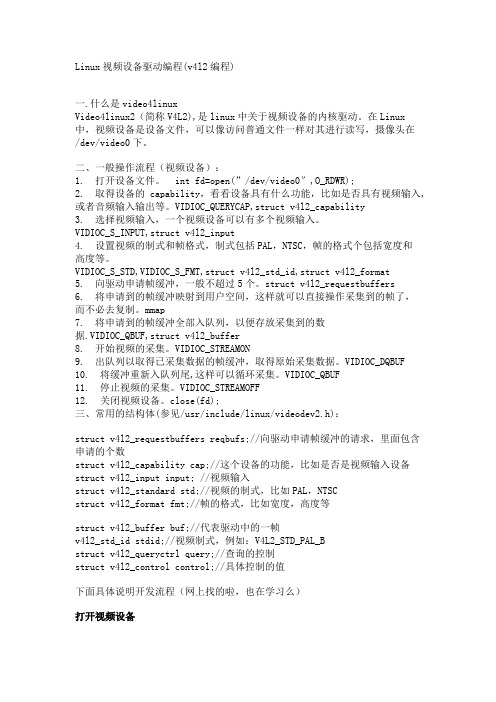
Linux视频设备驱动编程(v4l2编程)一.什么是video4linuxVideo4linux2(简称V4L2),是linux中关于视频设备的内核驱动。
在Linux 中,视频设备是设备文件,可以像访问普通文件一样对其进行读写,摄像头在/dev/video0下。
二、一般操作流程(视频设备):1. 打开设备文件。
int fd=open(”/dev/video0″,O_RDWR);2. 取得设备的capability,看看设备具有什么功能,比如是否具有视频输入,或者音频输入输出等。
VIDIOC_QUERYCAP,struct v4l2_capability3. 选择视频输入,一个视频设备可以有多个视频输入。
VIDIOC_S_INPUT,struct v4l2_input4. 设置视频的制式和帧格式,制式包括PAL,NTSC,帧的格式个包括宽度和高度等。
VIDIOC_S_STD,VIDIOC_S_FMT,struct v4l2_std_id,struct v4l2_format5. 向驱动申请帧缓冲,一般不超过5个。
struct v4l2_requestbuffers6. 将申请到的帧缓冲映射到用户空间,这样就可以直接操作采集到的帧了,而不必去复制。
mmap7. 将申请到的帧缓冲全部入队列,以便存放采集到的数据.VIDIOC_QBUF,struct v4l2_buffer8. 开始视频的采集。
VIDIOC_STREAMON9. 出队列以取得已采集数据的帧缓冲,取得原始采集数据。
VIDIOC_DQBUF10. 将缓冲重新入队列尾,这样可以循环采集。
VIDIOC_QBUF11. 停止视频的采集。
VIDIOC_STREAMOFF12. 关闭视频设备。
close(fd);三、常用的结构体(参见/usr/include/linux/videodev2.h):struct v4l2_requestbuffers reqbufs;//向驱动申请帧缓冲的请求,里面包含申请的个数struct v4l2_capability cap;//这个设备的功能,比如是否是视频输入设备struct v4l2_input input; //视频输入struct v4l2_standard std;//视频的制式,比如PAL,NTSCstruct v4l2_format fmt;//帧的格式,比如宽度,高度等struct v4l2_buffer buf;//代表驱动中的一帧v4l2_std_id stdid;//视频制式,例如:V4L2_STD_PAL_Bstruct v4l2_queryctrl query;//查询的控制struct v4l2_control control;//具体控制的值下面具体说明开发流程(网上找的啦,也在学习么)打开视频设备在V4L2中,视频设备被看做一个文件。
Linux设备驱动程序学习(9)-与硬件通信
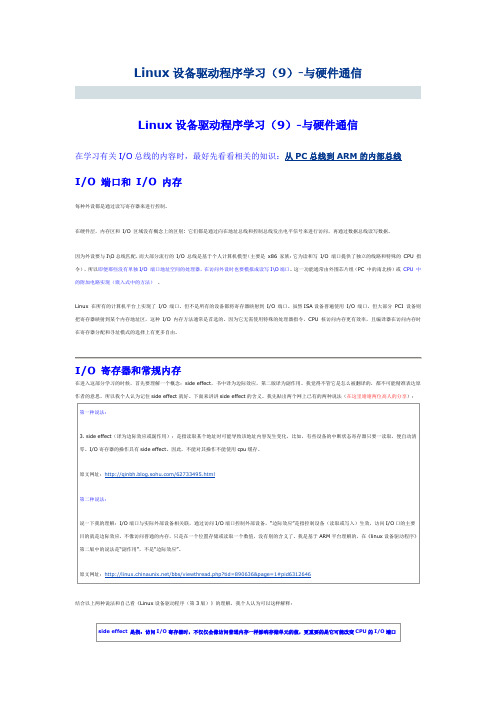
Linux设备驱动程序学习(9)-与硬件通信Linux设备驱动程序学习(9)-与硬件通信在学习有关I/O总线的内容时,最好先看看相关的知识:从PC总线到ARM的内部总线I/O 端口和I/O 内存每种外设都是通过读写寄存器来进行控制。
在硬件层,内存区和I/O 区域没有概念上的区别: 它们都是通过向在地址总线和控制总线发出电平信号来进行访问,再通过数据总线读写数据。
因为外设要与I\O总线匹配,而大部分流行的I/O 总线是基于个人计算机模型(主要是x86 家族:它为读和写I/O 端口提供了独立的线路和特殊的CPU 指令),所以即便那些没有单独I/O 端口地址空间的处理器,在访问外设时也要模拟成读写I\O端口。
这一功能通常由外围芯片组(PC 中的南北桥)或CPU 中的附加电路实现(嵌入式中的方法)。
Linux 在所有的计算机平台上实现了I/O 端口。
但不是所有的设备都将寄存器映射到I/O 端口。
虽然ISA设备普遍使用I/O 端口,但大部分PCI 设备则把寄存器映射到某个内存地址区,这种I/O 内存方法通常是首选的。
因为它无需使用特殊的处理器指令,CPU 核访问内存更有效率,且编译器在访问内存时在寄存器分配和寻址模式的选择上有更多自由。
I/O 寄存器和常规内存在进入这部分学习的时候,首先要理解一个概念:side effect,书中译为边际效应,第二版译为副作用。
我觉得不管它是怎么被翻译的,都不可能精准表达原作者的意思,所以我个人认为记住side effect就好。
下面来讲讲side effect的含义。
我先贴出两个网上已有的两种说法(在这里谢谢两位高人的分享):结合以上两种说法和自己看《Linux设备驱动程序(第3版)》的理解,我个人认为可以这样解释:I/O 寄存器和RAM 的主要不同就是I/O 寄存器操作有side effect, 而内存操作没有。
因为存储单元的访问速度对CPU 性能至关重要,编译器会对源代码进行优化,主要是: 使用高速缓存保存数值和重新编排读/写指令顺序。
Linux设备驱动之HID驱动---非常全面而且深刻

Linux设备驱动之HID驱动---⾮常全⾯⽽且深刻本⽂系本站原创,欢迎转载!转载请注明出处:/------------------------------------------⼀:前⾔继前⾯分析过UHCI和HUB驱动之后,接下来以HID设备驱动为例来做⼀个具体的USB设备驱动分析的例⼦.HID是Human Interface Devices的缩写.翻译成中⽂即为⼈机交互设备.这⾥的⼈机交互设备是⼀个宏观上⾯的概念,任何设备,只要符合HID spec,都⼆:HID驱动⼊⼝分析USB HID设备驱动⼊⼝位于linux-2.6.25/drivers/hid/usbhid/hid-core.c中.该module的⼊⼝为hid_init().代码如下:static int __init hid_init(void){int retval;retval = usbhid_quirks_init(quirks_param);if (retval)goto usbhid_quirks_init_fail;retval = hiddev_init();if (retval)goto hiddev_init_fail;retval = usb_register(&hid_driver);if (retval)goto usb_register_fail;info(DRIVER_VERSION ":" DRIVER_DESC);return0;usb_register_fail:hiddev_exit();hiddev_init_fail:usbhid_quirks_exit();usbhid_quirks_init_fail:return retval;}⾸先来看usbhid_quirks_init()函数.quirks我们在分析UHCI和HUB的时候也接触过,表⽰需要做某种修正的设备.该函数调⽤的参数是quirks_param.定义如下:static char *quirks_param[MAX_USBHID_BOOT_QUIRKS] = { [ 0 ... (MAX_USBHID_BOOT_QUIRKS - 1) ] = NULL };module_param_array_named(quirks, quirks_param, charp, NULL, 0444);从此可以看出, quirks_param是MAX_USBHID_BOOT_QUIRKS元素的字符串数组.并且在加载module的时候,可以动态的指定这些值.分析到这⾥.有⼈可以反应过来了,usbhid_quirks_init()是⼀种动态进⾏HID设备修正的⽅式.具体要修正哪些设备,要修正设备的那些⽅⾯,都可以由加载模块是所带参数来决定.usbhid_quirks_init()的代码如下:int usbhid_quirks_init(char **quirks_param){u16 idVendor, idProduct;u32 quirks;int n = 0, m;for (; quirks_param[n] && n < MAX_USBHID_BOOT_QUIRKS; n++) {m = sscanf(quirks_param[n], "0x%hx:0x%hx:0x%x",&idVendor, &idProduct, &quirks);if (m != 3 ||usbhid_modify_dquirk(idVendor, idProduct, quirks) != 0) {printk(KERN_WARNING"Could not parse HID quirk module param %s\n",quirks_param[n]);}}return0;}由此可以看出, quirks_param数组中的每⼀项可以分为三个部份,分别是要修正设备的VendorID,ProductID和要修正的功能.⽐如0x1000 0x0001 0x0004就表⽰:要忽略掉VendorID为0x1000,ProductID为0x0004的设备.(在代码中,有#define HID_QUIRK_跟进usbhid_modify_dquirk()函数,代码如下:int usbhid_modify_dquirk(const u16 idVendor, const u16 idProduct,const u32 quirks){struct quirks_list_struct *q_new, *q;int list_edited = 0;if (!idVendor) {dbg_hid("Cannot add a quirk with idVendor = 0\n");return -EINVAL;}q_new = kmalloc(sizeof(struct quirks_list_struct), GFP_KERNEL);if (!q_new) {dbg_hid("Could not allocate quirks_list_struct\n");return -ENOMEM;}q_new->hid_bl_item.idVendor = idVendor;q_new->hid_bl_item.idProduct = idProduct;q_new->hid_bl_item.quirks = quirks;down_write(&dquirks_rwsem);list_for_each_entry(q, &dquirks_list, node) {if (q->hid_bl_item.idVendor == idVendor &&q->hid_bl_item.idProduct == idProduct) {list_replace(&q->node, &q_new->node);kfree(q);list_edited = 1;break;}}if (!list_edited)list_add_tail(&q_new->node, &dquirks_list);up_write(&dquirks_rwsem);return0;}这个函数⽐较简单,就把quirks_param数组项中的三个部份存⼊⼀个封装结构.然后将其结构挂载到dquirks_list表.如果dquirks_list有重复的VendorId和ProductID就更新其quirks信息.经过usbhid_quirks_init()之后,所有要修正的设备的相关操作都会存放在dquirks_list中.返回到hid_init(),继续往下⾯分析.hiddev_init()是⼀个⽆关的操作,不会影响到后⾯的操作.忽略后⾯就是我们今天要分析的重点了,如下:retval = usb_register(&hid_driver);通过前⾯对HUB的驱动分析,相信对usb_redister()应该很熟悉了.hid_driver定义如下:static struct usb_driver hid_driver = {.name = "usbhid",.probe = hid_probe,.disconnect = hid_disconnect,.suspend = hid_suspend,.resume = hid_resume,.reset_resume = hid_post_reset,.pre_reset = hid_pre_reset,.post_reset = hid_post_reset,.id_table = hid_usb_ids,.supports_autosuspend = 1,};其中,id_table的结构为hid_usb_ids.定义如下:static struct usb_device_id hid_usb_ids [] = {{ .match_flags = USB_DEVICE_ID_MATCH_INT_CLASS,.bInterfaceClass = USB_INTERFACE_CLASS_HID },{ } /* Terminating entry */};也就是说,该驱动会匹配interface的ClassID,所有ClassID为USB_INTERFACE_CLASS_HID的设备都会被这个驱动所匹配.所以,所有USB HID设备都会由这个module来驱动.三:HID驱动的probe过程从上⾯的分析可看到,probe接⼝为hid_probe().定义如下:static int hid_probe(struct usb_interface *intf, const struct usb_device_id *id){struct hid_device *hid;char path[64];int i;char *c;dbg_hid("HID probe called for ifnum %d\n",intf->altsetting->desc.bInterfaceNumber);//config the hid deviceif (!(hid = usb_hid_configure(intf)))return -ENODEV;usbhid_init_reports(hid);hid_dump_device(hid);if (hid->quirks & HID_QUIRK_RESET_LEDS)usbhid_set_leds(hid);if (!hidinput_connect(hid))hid->claimed |= HID_CLAIMED_INPUT;if (!hiddev_connect(hid))hid->claimed |= HID_CLAIMED_HIDDEV;if (!hidraw_connect(hid))hid->claimed |= HID_CLAIMED_HIDRAW;usb_set_intfdata(intf, hid);if (!hid->claimed) {printk ("HID device claimed by neither input, hiddev nor hidraw\n");hid_disconnect(intf);return -ENODEV;}if ((hid->claimed & HID_CLAIMED_INPUT))hid_ff_init(hid);if (hid->quirks & HID_QUIRK_SONY_PS3_CONTROLLER)hid_fixup_sony_ps3_controller(interface_to_usbdev(intf),intf->cur_altsetting->desc.bInterfaceNumber);printk(KERN_INFO);if (hid->claimed & HID_CLAIMED_INPUT)printk("input");if ((hid->claimed & HID_CLAIMED_INPUT) && ((hid->claimed & HID_CLAIMED_HIDDEV) ||hid->claimed & HID_CLAIMED_HIDRAW))printk(",");if (hid->claimed & HID_CLAIMED_HIDDEV)printk("hiddev%d", hid->minor);if ((hid->claimed & HID_CLAIMED_INPUT) && (hid->claimed & HID_CLAIMED_HIDDEV) &&(hid->claimed & HID_CLAIMED_HIDRAW))printk(",");if (hid->claimed & HID_CLAIMED_HIDRAW)printk("hidraw%d", ((struct hidraw*)hid->hidraw)->minor);c = "Device";for (i = 0; i < hid->maxcollection; i++) {if (hid->collection[i].type == HID_COLLECTION_APPLICATION &&(hid->collection[i].usage & HID_USAGE_PAGE) == HID_UP_GENDESK &&(hid->collection[i].usage & 0xffff) < ARRAY_SIZE(hid_types)) {c = hid_types[hid->collection[i].usage & 0xffff];break;}}usb_make_path(interface_to_usbdev(intf), path, 63);printk(": USB HID v%x.%02x %s [%s] on %s\n",hid->version >> 8, hid->version & 0xff, c, hid->name, path);return0;}这个函数看起来是不是让⼈⼼慌慌?其实这个函数的最后⼀部份就是打印出⼀个Debug信息,我们根本就不需要去看. hiddev_connect()和hidraw_connect()是⼀个选择编译的操作,也不可以不要去理会.然后,剩下的就没多少了.3.1:usb_hid_configure()函数分析先来看usb_hid_configure().顾名思义,该接⼝⽤来配置hid设备.怎么配置呢?还是深⼊到代码来分析,该函数有⼀点长,分段分析如下:static struct hid_device *usb_hid_configure(struct usb_interface *intf){struct usb_host_interface *interface = intf->cur_altsetting;struct usb_device *dev = interface_to_usbdev (intf);struct hid_descriptor *hdesc;struct hid_device *hid;u32 quirks = 0;unsigned rsize = 0;char *rdesc;int n, len, insize = 0;struct usbhid_device *usbhid;quirks = usbhid_lookup_quirk(le16_to_cpu(dev->descriptor.idVendor),le16_to_cpu(dev->descriptor.idProduct));/* Many keyboards and mice don't like to be polled for reports,* so we will always set the HID_QUIRK_NOGET flag for them. *///如果是boot设备,跳出.不由此驱动处理if (interface->desc.bInterfaceSubClass == USB_INTERFACE_SUBCLASS_BOOT) {if (interface->desc.bInterfaceProtocol == USB_INTERFACE_PROTOCOL_KEYBOARD ||interface->desc.bInterfaceProtocol == USB_INTERFACE_PROTOCOL_MOUSE)quirks |= HID_QUIRK_NOGET;}//如果是要忽略的if (quirks & HID_QUIRK_IGNORE)return NULL;if ((quirks & HID_QUIRK_IGNORE_MOUSE) &&(interface->desc.bInterfaceProtocol == USB_INTERFACE_PROTOCOL_MOUSE))return NULL;⾸先找到该接⼝需要修正的操作,也就是上⾯代码中的quirks值,如果没有修正操作,则quirks为0.另外,根据usb hid spec中的定义,subclass如果为1,则说明该设备是⼀个boot阶段使⽤的hid设备,然后Protocol Code为1和2时分别代表Keyboard和Mouse. 如//get hid descriptorsif (usb_get_extra_descriptor(interface, HID_DT_HID, &hdesc) &&(!interface->desc.bNumEndpoints ||usb_get_extra_descriptor(&interface->endpoint[0], HID_DT_HID, &hdesc))) {dbg_hid("class descriptor not present\n");return NULL;}//bNumDescriptors:⽀持的附属描述符数⽬for (n = 0; n < hdesc->bNumDescriptors; n++)if (hdesc->desc[n].bDescriptorType == HID_DT_REPORT)rsize = le16_to_cpu(hdesc->desc[n].wDescriptorLength);//如果Report_Descriptors长度不合法if (!rsize || rsize > HID_MAX_DESCRIPTOR_SIZE) {dbg_hid("weird size of report descriptor (%u)\n", rsize);return NULL;}if (!(rdesc = kmalloc(rsize, GFP_KERNEL))) {dbg_hid("couldn't allocate rdesc memory\n");return NULL;}//Set idle_time = 0hid_set_idle(dev, interface->desc.bInterfaceNumber, 0, 0);//Get Report_Descriptorsif ((n = hid_get_class_descriptor(dev, interface->desc.bInterfaceNumber, HID_DT_REPORT, rdesc, rsize)) < 0) {dbg_hid("reading report descriptor failed\n");kfree(rdesc);return NULL;}//是否属于fixup?usbhid_fixup_report_descriptor(le16_to_cpu(dev->descriptor.idVendor),le16_to_cpu(dev->descriptor.idProduct), rdesc,rsize, rdesc_quirks_param);dbg_hid("report descriptor (size %u, read %d) = ", rsize, n);for (n = 0; n < rsize; n++)dbg_hid_line(" %02x", (unsigned char) rdesc[n]);dbg_hid_line("\n");对于HID设备来说,在interface description之后会附加⼀个hid description, hid description中的最后部份包含有Report description或者Physical Descriptors的长度.在上⾯的代码中,⾸先取得附加在interface description之后的hid description,然后,再从hid description中取得report description的长度.最后,取得report description的详细信息.在这⾥,还会将idle时间设备为0,表⽰⽆限时,即,从上⼀次报表传输后,只有在报表发⽣改变时,才会传送此报表内容,否则,传送NAK.这段代码的最后⼀部份是相关的fixup操作,不做详细分析.//pasrse the report_descriptorif (!(hid = hid_parse_report(rdesc, n))) {dbg_hid("parsing report descriptor failed\n");kfree(rdesc);return NULL;}kfree(rdesc);hid->quirks = quirks;if (!(usbhid = kzalloc(sizeof(struct usbhid_device), GFP_KERNEL)))goto fail_no_usbhid;hid->driver_data = usbhid;usbhid->hid = hid;解析获得的report description,解析之后的信息,存放在hid_device->collection和hid_device->report_enum[ ]中,这个解析过程之后会做详细分析.然后,初始化⼀个usbhid_device结构,使usbhid_device->hid指向刚解析report description获得的hid_device.同 usbhid->bufsize = HID_MIN_BUFFER_SIZE;//计算各传输⽅向的最⼤bufferhid_find_max_report(hid, HID_INPUT_REPORT, &usbhid->bufsize);hid_find_max_report(hid, HID_OUTPUT_REPORT, &usbhid->bufsize);hid_find_max_report(hid, HID_FEATURE_REPORT, &usbhid->bufsize);if (usbhid->bufsize > HID_MAX_BUFFER_SIZE)usbhid->bufsize = HID_MAX_BUFFER_SIZE;//in⽅向的传输最⼤值hid_find_max_report(hid, HID_INPUT_REPORT, &insize);if (insize > HID_MAX_BUFFER_SIZE)insize = HID_MAX_BUFFER_SIZE;if (hid_alloc_buffers(dev, hid)) {hid_free_buffers(dev, hid);goto fail;}计算传输数据的最⼤缓存区,并以这个⼤⼩为了hid设备的urb传输分配空间.另外,这⾥有⼀个最⼩值限制即代码中所看到的HID_MIN_BUFFER_SIZE,为64, 即⼀个⾼速设备的⼀个端点⼀次传输的数据量.在这⾥定义最⼩值为64是为了照顾低速然后,调⽤hid_alloc_buffers()为hid的urb传输初始化传输缓冲区.另外,需要注意的是,insize为INPUT⽅向的最⼤数据传输量.// 初始化usbhid->urbin和usbhid->usboutfor (n = 0; n < interface->desc.bNumEndpoints; n++) {struct usb_endpoint_descriptor *endpoint;int pipe;int interval;endpoint = &interface->endpoint[n].desc;//不是中断传输退出if ((endpoint->bmAttributes & 3) != 3) /* Not an interrupt endpoint */continue;interval = endpoint->bInterval;/* Change the polling interval of mice. *///修正⿏标的双击时间if (hid->collection->usage == HID_GD_MOUSE && hid_mousepoll_interval > 0)interval = hid_mousepoll_interval;if (usb_endpoint_dir_in(endpoint)) {if (usbhid->urbin)continue;if (!(usbhid->urbin = usb_alloc_urb(0, GFP_KERNEL)))goto fail;pipe = usb_rcvintpipe(dev, endpoint->bEndpointAddress);usb_fill_int_urb(usbhid->urbin, dev, pipe, usbhid->inbuf, insize,hid_irq_in, hid, interval);usbhid->urbin->transfer_dma = usbhid->inbuf_dma;usbhid->urbin->transfer_flags |= URB_NO_TRANSFER_DMA_MAP;} else {if (usbhid->urbout)continue;if (!(usbhid->urbout = usb_alloc_urb(0, GFP_KERNEL)))goto fail;pipe = usb_sndintpipe(dev, endpoint->bEndpointAddress);usb_fill_int_urb(usbhid->urbout, dev, pipe, usbhid->outbuf, 0,hid_irq_out, hid, interval);usbhid->urbout->transfer_dma = usbhid->outbuf_dma;usbhid->urbout->transfer_flags |= URB_NO_TRANSFER_DMA_MAP;}}if (!usbhid->urbin) {err_hid("couldn't find an input interrupt endpoint");goto fail;}遍历接⼝中的所有endpoint,并初始化in中断传输⽅向和out中断⽅向的urb.如果⼀个hid设备没有in⽅向的中断传输,⾮法.另外,在这⾥要值得注意的是, 在为OUT⽅向urb初始化的时候,它的传输缓存区⼤⼩被设为了0.IN⽅向的中断传输缓存区⼤⼩被设为了insize,传输缓存区⼤⼩在submit的时候会修正的. init_waitqueue_head(&hid->wait);INIT_WORK(&usbhid->reset_work, hid_reset);setup_timer(&usbhid->io_retry, hid_retry_timeout, (unsigned long) hid);spin_lock_init(&usbhid->inlock);spin_lock_init(&usbhid->outlock);spin_lock_init(&usbhid->ctrllock);hid->version = le16_to_cpu(hdesc->bcdHID);hid->country = hdesc->bCountryCode;hid->dev = &intf->dev;usbhid->intf = intf;usbhid->ifnum = interface->desc.bInterfaceNumber;hid->name[0] = 0;if (dev->manufacturer)strlcpy(hid->name, dev->manufacturer, sizeof(hid->name));if (dev->product) {if (dev->manufacturer)strlcat(hid->name, "", sizeof(hid->name));strlcat(hid->name, dev->product, sizeof(hid->name));}if (!strlen(hid->name))snprintf(hid->name, sizeof(hid->name), "HID %04x:%04x",le16_to_cpu(dev->descriptor.idVendor),le16_to_cpu(dev->descriptor.idProduct));hid->bus = BUS_USB;hid->vendor = le16_to_cpu(dev->descriptor.idVendor);hid->product = le16_to_cpu(dev->descriptor.idProduct);usb_make_path(dev, hid->phys, sizeof(hid->phys));strlcat(hid->phys, "/input", sizeof(hid->phys));len = strlen(hid->phys);if (len < sizeof(hid->phys) - 1)snprintf(hid->phys + len, sizeof(hid->phys) - len,"%d", intf->altsetting[0].desc.bInterfaceNumber);if (usb_string(dev, dev->descriptor.iSerialNumber, hid->uniq, 64) <= 0)hid->uniq[0] = 0;初始化hid的相关信息.//初始化hid 的ctrl传输usbhid->urbctrl = usb_alloc_urb(0, GFP_KERNEL);if (!usbhid->urbctrl)goto fail;usb_fill_control_urb(usbhid->urbctrl, dev, 0, (void *) usbhid->cr,usbhid->ctrlbuf, 1, hid_ctrl, hid);usbhid->urbctrl->setup_dma = usbhid->cr_dma;usbhid->urbctrl->transfer_dma = usbhid->ctrlbuf_dma;usbhid->urbctrl->transfer_flags |= (URB_NO_TRANSFER_DMA_MAP | URB_NO_SETUP_DMA_MAP);hid->hidinput_input_event = usb_hidinput_input_event;hid->hid_open = usbhid_open;hid->hid_close = usbhid_close;#ifdef CONFIG_USB_HIDDEVhid->hiddev_hid_event = hiddev_hid_event;hid->hiddev_report_event = hiddev_report_event;#endifhid->hid_output_raw_report = usbhid_output_raw_report;return hid;初始化usbhid的控制传输urb,之后⼜初始化了usbhid的⼏个操作函数.这个操作有什么⽤途,等⽤到的时候再来进⾏分析.fail:usb_free_urb(usbhid->urbin);usb_free_urb(usbhid->urbout);usb_free_urb(usbhid->urbctrl);hid_free_buffers(dev, hid);kfree(usbhid);fail_no_usbhid:hid_free_device(hid);return NULL;}经过上⾯的分析之后,我们对这个函数的⼤概操作有了⼀定的了解.现在分析⾥⾯调⽤的⼀些重要的⼦调函数.等这些⼦函数全部分析完了之后,不妨回过头看下这个函数.3.1.1:hid_parse_report()分析第⼀个要分析的函数是hid_parse_report().该函数⽤来解析report description.解析report description是⼀个繁杂的过程,对这个描述符不太清楚的,仔细看⼀下spec.在这⾥我们只会做代码上的分析.代码如下:struct hid_device *hid_parse_report(__u8 *start, unsigned size){struct hid_device *device;struct hid_parser *parser;struct hid_item item;__u8 *end;unsigned i;static int (*dispatch_type[])(struct hid_parser *parser,struct hid_item *item) = {hid_parser_main,hid_parser_global,hid_parser_local,hid_parser_reserved};if (!(device = kzalloc(sizeof(struct hid_device), GFP_KERNEL)))return NULL;//默认HID_DEFAULT_NUM_COLLECTIONS 项if (!(device->collection = kzalloc(sizeof(struct hid_collection) *HID_DEFAULT_NUM_COLLECTIONS, GFP_KERNEL))) {kfree(device);return NULL;}//hid_device->collection_size: collection的项数device->collection_size = HID_DEFAULT_NUM_COLLECTIONS;for (i = 0; i < HID_REPORT_TYPES; i++)INIT_LIST_HEAD(&device->report_enum[i].report_list);if (!(device->rdesc = kmalloc(size, GFP_KERNEL))) {kfree(device->collection);kfree(device);return NULL;}//hid_device->rdesc存放report_descriptor,hid_device->size存放这个描述符的⼤⼩memcpy(device->rdesc, start, size);device->rsize = size;if (!(parser = vmalloc(sizeof(struct hid_parser)))) {kfree(device->rdesc);kfree(device->collection);kfree(device);return NULL;}memset(parser, 0, sizeof(struct hid_parser));parser->device = device;end = start + size;while ((start = fetch_item(start, end, &item)) != NULL) {//long item在这⾥暂不做parseif (item.format != HID_ITEM_FORMAT_SHORT) {dbg_hid("unexpected long global item\n");hid_free_device(device);vfree(parser);return NULL;}//parse the short itemif (dispatch_type[item.type](parser, &item)) {dbg_hid("item %u %u %u %u parsing failed\n",item.format, (unsigned)item.size, (unsigned)item.type, (unsigned)item.tag);hid_free_device(device);vfree(parser);return NULL;}//如果全部解析完了if (start == end) {if (parser->collection_stack_ptr) {dbg_hid("unbalanced collection at end of report description\n");hid_free_device(device);vfree(parser);return NULL;}if (parser->local.delimiter_depth) {dbg_hid("unbalanced delimiter at end of report description\n");hid_free_device(device);vfree(parser);return NULL;}vfree(parser);return device;}}dbg_hid("item fetching failed at offset %d\n", (int)(end - start));hid_free_device(device);vfree(parser);return NULL;}进⼊到这个函数,我们⾸先看到的是Main,Globa,Local标签的解析函数.然后,分配并初始化了hid_device结构和hid_ parser.在代码中我们看到,hid_ parser-> device指向了hid_device.后hid_device没有任何域指向hid_parser. 实际上hid_parser只是⼀个辅另外,hid_device-> rdesc保存了⼀份report description副本.然后,就开始对report description的解析.函数fetch_item()⽤来取出report description的⼀项数据.代码如下:static u8 *fetch_item(__u8 *start, __u8 *end, struct hid_item *item){u8 b;//合法性检测if ((end - start) <= 0)return NULL;//取前⾯⼀个字节.对于短项.它的⾸个字节定义了bsize,bType,bTag.⽽对于长项,它的值为0xFEb = *start++;item->type = (b >> 2) & 3;item->tag = (b >> 4) & 15;//如果为长项.它的Type和Tag在其后的⼆个字节中.item->data.longdata指向数据的起始位置if (item->tag == HID_ITEM_TAG_LONG) {item->format = HID_ITEM_FORMAT_LONG;if ((end - start) < 2)return NULL;item->size = *start++;item->tag = *start++;if ((end - start) < item->size)return NULL;item->data.longdata = start;start += item->size;return start;}//对于短项的情况.取得size值.并根据size值取得它的data域item->format = HID_ITEM_FORMAT_SHORT;item->size = b & 3;switch (item->size) {case0:return start;case1:if ((end - start) < 1)return NULL;item->data.u8 = *start++;return start;case2:if ((end - start) < 2)return NULL;item->data.u16 = le16_to_cpu(get_unaligned((__le16*)start));start = (__u8 *)((__le16 *)start + 1);return start;case3:item->size++;if ((end - start) < 4)return NULL;item->data.u32 = le32_to_cpu(get_unaligned((__le32*)start));start = (__u8 *)((__le32 *)start + 1);return start;}return NULL;}对照代码中的注释,应该很容易看懂这个函数,不再详细分析.返回到hid_parse_report()中,取得相应项之后,如果是长项,这⾥不会做处理.对于短项.为不同的type调⽤不同的解析函数.3.1.1.1:Global项解析Global的解析⼊⼝是hid_parser_global().代码如下:static int hid_parser_global(struct hid_parser *parser, struct hid_item *item){switch (item->tag) {//PUSH项case HID_GLOBAL_ITEM_TAG_PUSH:if (parser->global_stack_ptr == HID_GLOBAL_STACK_SIZE) {dbg_hid("global enviroment stack overflow\n");return -1;}memcpy(parser->global_stack + parser->global_stack_ptr++,&parser->global, sizeof(struct hid_global));return0;//POP项case HID_GLOBAL_ITEM_TAG_POP:if (!parser->global_stack_ptr) {dbg_hid("global enviroment stack underflow\n");return -1;}memcpy(&parser->global, parser->global_stack + --parser->global_stack_ptr,sizeof(struct hid_global));return0;case HID_GLOBAL_ITEM_TAG_USAGE_PAGE:parser->age_page = item_udata(item);return0;case HID_GLOBAL_ITEM_TAG_LOGICAL_MINIMUM:parser->global.logical_minimum = item_sdata(item);return0;case HID_GLOBAL_ITEM_TAG_LOGICAL_MAXIMUM:if (parser->global.logical_minimum < 0)parser->global.logical_maximum = item_sdata(item);elseparser->global.logical_maximum = item_udata(item);return0;case HID_GLOBAL_ITEM_TAG_PHYSICAL_MINIMUM:parser->global.physical_minimum = item_sdata(item);return0;case HID_GLOBAL_ITEM_TAG_PHYSICAL_MAXIMUM:if (parser->global.physical_minimum < 0)parser->global.physical_maximum = item_sdata(item);elseparser->global.physical_maximum = item_udata(item);return0;case HID_GLOBAL_ITEM_TAG_UNIT_EXPONENT:parser->global.unit_exponent = item_sdata(item);return0;case HID_GLOBAL_ITEM_TAG_UNIT:parser->global.unit = item_udata(item);return0;case HID_GLOBAL_ITEM_TAG_REPORT_SIZE:if ((parser->global.report_size = item_udata(item)) > 32) {dbg_hid("invalid report_size %d\n", parser->global.report_size);return -1;}return0;case HID_GLOBAL_ITEM_TAG_REPORT_COUNT:if ((parser->global.report_count = item_udata(item)) > HID_MAX_USAGES) {dbg_hid("invalid report_count %d\n", parser->global.report_count);return -1;}return0;case HID_GLOBAL_ITEM_TAG_REPORT_ID:if ((parser->global.report_id = item_udata(item)) == 0) {dbg_hid("report_id 0 is invalid\n");return -1;}return0;default:dbg_hid("unknown global tag 0x%x\n", item->tag);return -1;}}这个函数虽然长,但是逻辑很简单,对于global信息,存放在hid_parse->global中.如果遇到了PUSH项,将当前的global项⼊栈,栈即为hid_parse-> global_stack[ ].当前的栈顶位置由hid_parse-> global_stack_ptr指定.如果遇到了POP项,就将栈中的global信息出栈.3.1.1.2:Local项解析Local项解析的相应接⼝为hid_parser_local().代码如下:static int hid_parser_local(struct hid_parser *parser, struct hid_item *item){__u32 data;unsigned n;if (item->size == 0) {dbg_hid("item data expected for local item\n");return -1;}data = item_udata(item);switch (item->tag) {//DELIMITER项,定义⼀个Local项的开始case HID_LOCAL_ITEM_TAG_DELIMITER://data>1:⼀个local项开始,0:⼀个local项结束//parse->local.delimiter_branch:表⽰local项计数.//进⼊⼀个local项时,local.delimiter_depth为1,退出⼀个local项时local.delimiter_depth为0// TODO: Local项不能嵌套if (data) {/** We treat items before the first delimiter* as global to all usage sets (branch 0).* In the moment we process only these global* items and the first delimiter set.*/if (parser->local.delimiter_depth != 0) {dbg_hid("nested delimiters\n");return -1;}parser->local.delimiter_depth++;parser->local.delimiter_branch++;} else {if (parser->local.delimiter_depth < 1) {dbg_hid("bogus close delimiter\n");return -1;}parser->local.delimiter_depth--;}return1;//以下各项不能出现在有DELIMITER标签的地⽅case HID_LOCAL_ITEM_TAG_USAGE:if (parser->local.delimiter_branch > 1) {dbg_hid("alternative usage ignored\n");return0;}//local的usage项有扩展⽤法,它的⾼16可以定义usage_page.如果⾼16为空,它的//usage_page则定义在global中的usage_page if (item->size <= 2)data = (parser->age_page << 16) + data;//然后添加到parse->local的usage列表return hid_add_usage(parser, data);//对于有usage_min和usage_max的情况,将usage_min和usage_max之间的usage添加到//parse=>local的usage列表case HID_LOCAL_ITEM_TAG_USAGE_MINIMUM:if (parser->local.delimiter_branch > 1) {dbg_hid("alternative usage ignored\n");return0;}if (item->size <= 2)data = (parser->age_page << 16) + data;parser->age_minimum = data;return0;case HID_LOCAL_ITEM_TAG_USAGE_MAXIMUM:if (parser->local.delimiter_branch > 1) {dbg_hid("alternative usage ignored\n");return0;}if (item->size <= 2)data = (parser->age_page << 16) + data;for (n = parser->age_minimum; n <= data; n++)if (hid_add_usage(parser, n)) {dbg_hid("hid_add_usage failed\n");return -1;}return0;default:dbg_hid("unknown local item tag 0x%x\n", item->tag);return0;}return0;}详细分析⼀下hid_add_usage().代码如下:static int hid_add_usage(struct hid_parser *parser, unsigned usage){if (parser->age_index >= HID_MAX_USAGES) {dbg_hid("usage index exceeded\n");return -1;}parser->age[parser->age_index] = usage;parser->local.collection_index[parser->age_index] =parser->collection_stack_ptr ?parser->collection_stack[parser->collection_stack_ptr - 1] : 0;parser->age_index++;return0;}如果usage项超过了HID_MAX_USAGES,为⾮法.最⼤为8192项.Parse->age_index表⽰local的项数,当然也表⽰了parse->age[ ]数组中的下⼀个可⽤项.parser->local.collection_index表⽰该usage所在的collection项序号.具体的collection信息存放在hid_deivce->collection[ ]中.关于collection我们在分析Main项解析的时候会详细分析.3.1.1.3:Main项解析Main项解析的⼊⼝为hid_parser_main().代码如下:static int hid_parser_main(struct hid_parser *parser, struct hid_item *item){__u32 data;int ret;//data域data = item_udata(item);switch (item->tag) {//Collectioncase HID_MAIN_ITEM_TAG_BEGIN_COLLECTION:ret = open_collection(parser, data & 0xff);break;//End Collectioncase HID_MAIN_ITEM_TAG_END_COLLECTION:ret = close_collection(parser);break;//Inputcase HID_MAIN_ITEM_TAG_INPUT:ret = hid_add_field(parser, HID_INPUT_REPORT, data);break;//Outpputcase HID_MAIN_ITEM_TAG_OUTPUT:ret = hid_add_field(parser, HID_OUTPUT_REPORT, data);break;//Featurecase HID_MAIN_ITEM_TAG_FEATURE:ret = hid_add_field(parser, HID_FEATURE_REPORT, data);break;default:dbg_hid("unknown main item tag 0x%x\n", item->tag);ret = 0;}memset(&parser->local, 0, sizeof(parser->local)); /* Reset the local parser environment */return ret;}对Main项的解析要稍微复杂⼀点,Main项主要有两个部份,⼀个是Collection,⼀个是Input/Output/Feature项.先来看Collection项的解析.所有的collection信息都存放在hid_device->collection[ ]中.⽽Collection项⼜有嵌套的情况,每遇到⼀个Collection项就将collection的序号⼊栈,栈为parser_device->collection_stack[ ].栈顶指针为parser_device->collection_stack_ptr .遇到了⼀个end coll 熟悉这个⼤概的情况之后,就可以跟进open_collection()了.代码如下://所有的collection都存放在hid_dev->collection 中, ⽽hid_dev->maxcollection 表⽰collection[]中的下⼀个空闲位置//paser->collection_stack[ ]存放的是当前解析的collection在hid_dev->collection[ ]中的序号static int open_collection(struct hid_parser *parser, unsigned type){struct hid_collection *collection;unsigned usage;usage = parser->age[0];//colletcion嵌套过多if (parser->collection_stack_ptr == HID_COLLECTION_STACK_SIZE) {dbg_hid("collection stack overflow\n");return -1;}//device->maxcollection:存放的collection个数//device->collection[ ]太⼩,必须扩⼤存放空间if (parser->device->maxcollection == parser->device->collection_size) {collection = kmalloc(sizeof(struct hid_collection) *parser->device->collection_size * 2, GFP_KERNEL);if (collection == NULL) {dbg_hid("failed to reallocate collection array\n");return -1;}memcpy(collection, parser->device->collection,sizeof(struct hid_collection) *parser->device->collection_size);memset(collection + parser->device->collection_size, 0,sizeof(struct hid_collection) *parser->device->collection_size);kfree(parser->device->collection);parser->device->collection = collection;parser->device->collection_size *= 2;}//将collection序号⼊栈parser->collection_stack[parser->collection_stack_ptr++] =parser->device->maxcollection;//存⼊hid_device->collection[]collection = parser->device->collection +parser->device->maxcollection++;collection->type = type;collection->usage = usage;//collection的深度collection->level = parser->collection_stack_ptr - 1;if (type == HID_COLLECTION_APPLICATION)parser->device->maxapplication++;return0;}对照上⾯的分析和函数中的注释,理解这个函数应该很简单,不做详细分析.对于Input/Output/Feature项的解析:先来看⼀下hid_device结构的定义⽚段:struct hid_device{…………struct hid_report_enum report_enum[HID_REPORT_TYPES];……}对于INPUT/OUTPUT/FEATURE,每种类型都对应report_enum[ ]中的⼀项.Struct hid_report_enum定义如下:struct hid_report_enum {unsigned numbered;struct list_head report_list;struct hid_report *report_id_hash[256];};对于每⼀个report_id,对应report_id_hash[ ]中的⼀项,同时,将所对应的hid_report添加到report_list链表中.如果有多个report_id 的情况,numbered被赋为1.Struct hid_report定义如下:struct hid_report {struct list_head list;unsigned id; /* id of this report */unsigned type; /* report type */struct hid_field *field[HID_MAX_FIELDS]; /* fields of the report */unsigned maxfield; /* maximum valid field index */unsigned size; /* size of the report (bits) */struct hid_device *device; /* associated device */}List:⽤来形成链表Id:表⽰report_idType: INPUT/OUTPUT/FEATUREField[ ]:成员列表,对应⼀个report_id有多个INPUT(OUTPUT/FEATURE)项Maxfield: field[ ]中的有效项数Size: 该report的⼤⼩Device:所属的hid_device了解了这些之后,就可以来看⼀下代码了:如下:static int hid_add_field(struct hid_parser *parser, unsigned report_type, unsigned flags){struct hid_report *report;struct hid_field *field;int usages;unsigned offset;int i;//找到类型和对应report_id所在的report.如果不存在,则新建之if (!(report = hid_register_report(parser->device, report_type, parser->global.report_id))) {dbg_hid("hid_register_report failed\n");return -1;}//对当前global数据的有效性判断。
LinuxI2C驱动--用户态驱动简单示例

LinuxI2C驱动--⽤户态驱动简单⽰例1. Linux内核⽀持I2C通⽤设备驱动(⽤户态驱动:由应⽤层实现对硬件的控制可以称之为⽤户态驱动),实现⽂件位于drivers/i2c/i2c-dev.c,设备⽂件为/dev/i2c-02. I2C通⽤设备驱动以字符设备注册进内核的static const struct file_operations i2cdev_fops = {.owner = THIS_MODULE,.llseek = no_llseek,.read = i2cdev_read,.write = i2cdev_write,.unlocked_ioctl = i2cdev_ioctl,.open = i2cdev_open,.release = i2cdev_release,};res = register_chrdev(I2C_MAJOR, "i2c", &i2cdev_fops);3. 对设备⽂件进⾏读写时,可以调⽤read、write或者ioctl等⽅法,他们都是通过调⽤函数i2c_transfer来实现对I2C设备的操作的int i2c_transfer(struct i2c_adapter * adap, struct i2c_msg *msgs, int num){int ret;/* REVISIT the fault reporting model here is weak:** - When we get an error after receiving N bytes from a slave,* there is no way to report "N".** - When we get a NAK after transmitting N bytes to a slave,* there is no way to report "N" ... or to let the master* continue executing the rest of this combined message, if* that's the appropriate response.** - When for example "num" is two and we successfully complete* the first message but get an error part way through the* second, it's unclear whether that should be reported as* one (discarding status on the second message) or errno* (discarding status on the first one).*/if (adap->algo->master_xfer) {#ifdef DEBUGfor (ret = 0; ret < num; ret++) {dev_dbg(&adap->dev, "master_xfer[%d] %c, addr=0x%02x, ""len=%d%s\n", ret, (msgs[ret].flags & I2C_M_RD)'R' : 'W', msgs[ret].addr, msgs[ret].len,(msgs[ret].flags & I2C_M_RECV_LEN) ? "+" : "");}#endifif (in_atomic() || irqs_disabled()) {ret = mutex_trylock(&adap->bus_lock);if (!ret)/* I2C activity is ongoing. */return -EAGAIN;} else {mutex_lock_nested(&adap->bus_lock, adap->level);}ret = adap->algo->master_xfer(adap,msgs,num);mutex_unlock(&adap->bus_lock);return ret;} else {dev_dbg(&adap->dev, "I2C level transfers not supported\n");return -EOPNOTSUPP;}}4. i2c_transfer通过代码可以看出,i2c_transfer 通过调⽤相应的 adapter 的 master_xfer ⽅法实现的,⽽ master_xfer 主要是根据 struct i2c_msg 类型的msgs来进⾏处理的。
实验七Linux块设备驱动
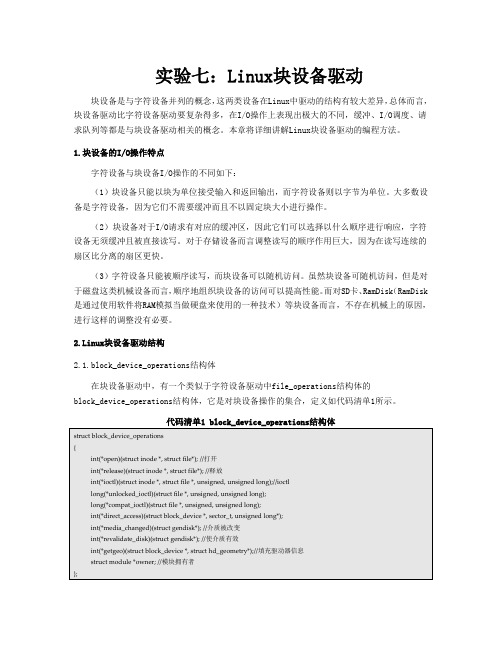
实验七:Linux块设备驱动块设备是与字符设备并列的概念,这两类设备在Linux中驱动的结构有较大差异,总体而言,块设备驱动比字符设备驱动要复杂得多,在I/O操作上表现出极大的不同,缓冲、I/O调度、请求队列等都是与块设备驱动相关的概念。
本章将详细讲解Linux块设备驱动的编程方法。
1.块设备的I/O操作特点字符设备与块设备I/O操作的不同如下:(1)块设备只能以块为单位接受输入和返回输出,而字符设备则以字节为单位。
大多数设备是字符设备,因为它们不需要缓冲而且不以固定块大小进行操作。
(2)块设备对于I/O请求有对应的缓冲区,因此它们可以选择以什么顺序进行响应,字符设备无须缓冲且被直接读写。
对于存储设备而言调整读写的顺序作用巨大,因为在读写连续的扇区比分离的扇区更快。
(3)字符设备只能被顺序读写,而块设备可以随机访问。
虽然块设备可随机访问,但是对于磁盘这类机械设备而言,顺序地组织块设备的访问可以提高性能。
而对SD卡、RamDisk(RamDisk 是通过使用软件将RAM模拟当做硬盘来使用的一种技术)等块设备而言,不存在机械上的原因,进行这样的调整没有必要。
2.Linux块设备驱动结构2.1.block_device_operations结构体在块设备驱动中,有一个类似于字符设备驱动中file_operations结构体的block_device_operations结构体,它是对块设备操作的集合,定义如代码清单1所示。
代码清单1 block_device_operations结构体下面对其主要的成员函数进行分析。
与字符设备驱动类似,当设备被打开和关闭时将调用它们。
2.IO控制上述函数是ioctl()系统调用的实现,块设备包含大量的标准请求,这些标准请求由Linux 块设备层处理,因此大部分块设备驱动的ioctl()函数相当短。
被内核调用来检查是否驱动器中的介质已经改变,如果是,则返回一个非0值,否则返回0。
linux设备驱动之8250串口驱动

linux设备驱动之8250串口驱动一:前言前一段时间自己实践了一下8250芯片串口驱动的编写。
今天就在此基础上分析一下linux kernel自带的串口驱动。
毕竟只有对比专业的驱动代码才能更好的进步,同以往一样,基于linix kernel2.6.25.相应驱动代码位于:linux-2.6.25/drivers/serial/8250.c。
二:8250串口驱动初始化相应的初始化函数为serial8250_init().代码如下:static int __init serial8250_init(void){int ret, i;if (nr_uarts > UART_NR)nr_uarts = UART_NR;printk(KERN_INFO "Serial: 8250/16550 driver $Revision: 1.90 $ ""%d ports, IRQ sharing %sabled\n", nr_uarts,share_irqs ? "en" : "dis");for (i = 0; i < NR_IRQS; i++)spin_lock_init(&irq_lists[i].lock);ret = uart_register_driver(&serial8250_reg);if (ret)goto out;serial8250_isa_devs = platform_device_alloc("serial8250",PLA T8250_DEV_LEGACY);if (!serial8250_isa_devs) {ret = -ENOMEM;goto unreg_uart_drv;}ret = platform_device_add(serial8250_isa_devs);if (ret)goto put_dev;serial8250_register_ports(&serial8250_reg, &serial8250_isa_devs->dev);ret = platform_driver_register(&serial8250_isa_driver);if (ret == 0)goto out;platform_device_del(serial8250_isa_devs);put_dev:platform_device_put(serial8250_isa_devs);unreg_uart_drv:uart_unregister_driver(&serial8250_reg);out:return ret;}这段代码涉及到的知识要求,如platform ,uart等我们在之前都已经做过详细的分析。
Linux设备驱动之USBhub驱动
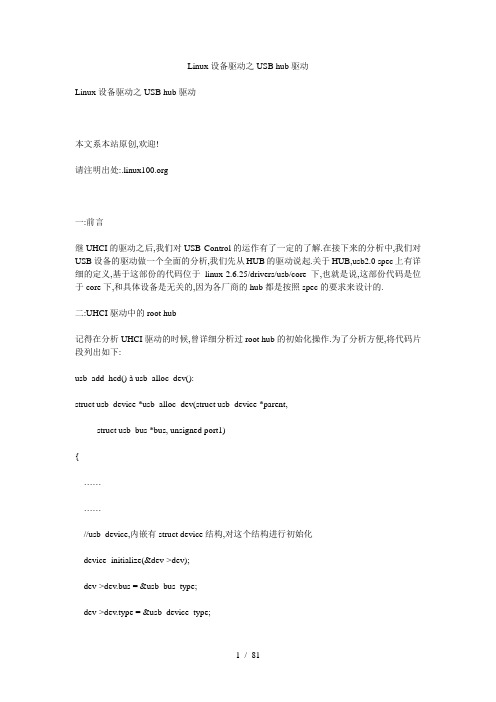
Linux设备驱动之USB hub驱动Linux设备驱动之USB hub驱动------------------------------------------本文系本站原创,欢迎!请注明出处:------------------------------------------一:前言继UHCI的驱动之后,我们对USB Control的运作有了一定的了解.在接下来的分析中,我们对USB设备的驱动做一个全面的分析,我们先从HUB的驱动说起.关于HUB,usb2.0 spec上有详细的定义,基于这部份的代码位于linux-2.6.25/drivers/usb/core下,也就是说,这部份代码是位于core下,和具体设备是无关的,因为各厂商的hub都是按照spec的要求来设计的.二:UHCI驱动中的root hub记得在分析UHCI驱动的时候,曾详细分析过root hub的初始化操作.为了分析方便,将代码片段列出如下:usb_add_hcd() à usb_alloc_dev():struct usb_device *usb_alloc_dev(struct usb_device *parent,struct usb_bus *bus, unsigned port1){…………//usb_device,内嵌有struct device结构,对这个结构进行初始化device_initialize(&dev->dev);dev->dev.bus = &usb_bus_type;dev->dev.type = &usb_device_type;…………}一看到前面对dev的赋值,根据我们对设备模型的理解,一旦这个device进行注册,就会发生driver和device的匹配过程了.不过,现在还不是分析这个过程的时候,我们先来看一下,USB子系统中的两种驱动.三:USB子系统中的两种驱动linux-2.6.25/drivers/usb/core/driver.c中,我们可以找到两种register driver的方式,分别为usb_register_driver()和usb_register_device_driver().分别来分析一下这两个接口.usb_register_device_driver()接口的代码如下:int usb_register_device_driver(struct usb_device_driver *new_udriver,struct module *owner){int retval = 0;if (usb_disabled())return -ENODEV;new_udriver->drvwrap.for_devices = 1;new_udriver-> = (char *) new_udriver->name;new_udriver->drvwrap.driver.bus = &usb_bus_type;new_udriver->drvwrap.driver.probe = usb_probe_device;new_udriver->drvwrap.driver.remove = usb_unbind_device;new_udriver->drvwrap.driver.owner = owner;retval = driver_register(&new_udriver->drvwrap.driver);if (!retval) {pr_info(“%s: registered new device driver %s\n”,usbcore_name, new_udriver->name);usbfs_update_special();} else {printk(KERN_ERR “%s: error %d registering device ““ driver %s\n”,usbcore_name, retval, new_udriver->name);}return retval;}首先,通过usb_disabled()来判断一下usb是否被禁用,如果被禁用,当然就不必执行下面的流程了,直接退出即可.从上面的代码,很明显可以看到, struct usb_device_driver 对struct device_driver进行了一次封装,我们注意一下这里的赋值操作:new_udriver->drvwrap.for_devices = 1.等等.这些在后面都是用派上用场的.usb_register_driver()的代码如下:int usb_register_driver(struct usb_driver *new_driver, struct module *owner, const char *mod_name){int retval = 0;if (usb_disabled())return -ENODEV;new_driver->drvwrap.for_devices = 0;new_driver-> = (char *) new_driver->name;new_driver->drvwrap.driver.bus = &usb_bus_type;new_driver->drvwrap.driver.probe = usb_probe_interface;new_driver->drvwrap.driver.remove = usb_unbind_interface;new_driver->drvwrap.driver.owner = owner;new_driver->drvwrap.driver.mod_name = mod_name;spin_lock_init(&new_driver->dynids.lock);INIT_LIST_HEAD(&new_driver->dynids.list);retval = driver_register(&new_driver->drvwrap.driver);if (!retval) {pr_info(“%s: registered new interface dr iver %s\n”,usbcore_name, new_driver->name);usbfs_update_special();usb_create_newid_file(new_driver);} else {printk(KERN_ERR “%s: error %d registering interface ““ driver %s\n”,usbcore_name, retval, new_driver->name);}return retval;}很明显,在这里接口里,将new_driver->drvwrap.for_devices设为了0.而且两个接口的porbe()函数也不一样.其实,对于usb_register_driver()可以看作是usb设备中的接口驱动,而usb_register_device_driver()是一个单纯的USB设备驱动.四: hub的驱动分析4.1: usb_bus_type->match()的匹配过程usb_bus_type->match()用来判断驱动和设备是否匹配,它的代码如下:static int usb_device_match(struct device *dev, struct device_driver *drv){/* 整理by *///usb device的情况if (is_usb_device(dev)) {/* interface drivers never match devices */ if (!is_usb_device_driver(drv))return 0;/* TODO: Add real matching code */ return 1;}//interface的情况else {struct usb_interface *intf;struct usb_driver *usb_drv;const struct usb_device_id *id;/*整理by */if (is_usb_device_driver(drv))return 0;intf = to_usb_interface(dev);usb_drv = to_usb_driver(drv);id = usb_match_id(intf, usb_drv->id_table);if (id)return 1;id = usb_match_dynamic_id(intf, usb_drv);if (id)return 1;}return 0;}这里的match会区分上面所说的两种驱动,即设备的驱动和接口的驱动. is_usb_device()的代码如下:static inline int is_usb_device(const struct device *dev){return dev->type == &usb_device_type;}很明显,对于root hub来说,这个判断是肯定会满足的.static inline int is_usb_device_driver(struct device_driver *drv){return container_of(drv, struct usbdrv_wrap, driver)->for_devices;}回忆一下,我们在分析usb_register_device_driver()的时候,不是将new_udriver->drvwrap.for_devices置为了1么?所以对于usb_register_device_driver()注册的驱动来说,这里也是会满足的.因此,对应root hub的情况,从第一个if就会匹配到usb_register_device_driver()注册的驱动.对于接口的驱动,我们等遇到的时候再来进行分析.4.2:root hub的驱动入口既然我们知道,root hub会匹配到usb_bus_type->match()的驱动,那这个驱动到底是什么呢?我们从usb子系统的初始化开始说起.在linux-2.6.25/drivers/usb/core/usb.c中.有这样的一段代码:subsys_initcall(usb_init);对于subsys_initcall()我们已经不陌生了,在很多地方都会遇到它.在系统初始化的时候,会调用到它对应的函数.在这里,即为usb_init().在usb_init()中,有这样的代码片段:static int __init usb_init(void){…………retval = usb_register_device_driver(&usb_generic_driver, THIS_MODULE);if (!retval)goto out;……}在这里终于看到usb_register_device_driver()了. usb_generic_driver会匹配到所有usb 设备.定义如下:struct usb_device_driver usb_generic_driver = {.name = “usb”,.probe = generic_probe,.disconnect = generic_disconnect,#ifdefCONFIG_PM.suspend = generic_suspend,.resume = generic_resume,#endif.supports_autosuspend = 1,};现在是到分析probe()的时候了.我们这里说的并不是usb_generic_driver中的probe,而是封装在struct usb_device_driver中的driver对应的probe函数.在上面的分析, usb_register_device_driver()将封装的driver的probe()函数设置为了usb_probe_device().代码如下:static int usb_probe_device(struct device *dev){struct usb_device_driver *udriver = to_usb_device_driver(dev->driver);struct usb_device *udev;int error = -ENODEV;dev_dbg(dev, “%s\n”, __FUNCTION__);//再次判断dev是否是usb deviceif (!is_usb_device(dev)) /* Sanity check */return error;udev = to_usb_device(dev);/* TODO: Add real matching code *//* The device should always appear to be in use* unless the driver suports autosuspend.*///pm_usage_t: autosuspend计数.如果此计数为1,则不允许autosuspendudev->pm_usage_t = !(udriver->supports_autosuspend);error = udriver->probe(udev);return error;}首先,可以通过container_of()将封装的struct device, struct device_driver转换为struct usb_device和struct usb_device_driver.然后,再执行一次安全检查,判断dev是否是属于一个usb device.在这里,我们首次接触到了hub suspend.如果不支持suspend(udriver->supports_autosuspend为0),则udev->pm_usage_t被设为1,也就是说,它不允许设备suspend.否则,将其初始化为0. 最后,正如你所看到的,流程转入到了usb_device_driver->probe().对应到root hub,流程会转入到generic_probe().代码如下:static int generic_probe(struct usb_device *udev){int err, c;/* put device-specific files into sysfs */usb_create_sysfs_dev_files(udev);/* Choose and set the configuration.This registers the interfaces* with the driver core and lets interface drivers bind to them.*/if (udev->authorized == 0)dev_err(&udev->dev, “Device is not authorized for usage\n”);else {//选择和设定一个配置c = usb_choose_configuration(udev);if (c >= 0) {err = usb_set_configuration(udev, c);if (err) {dev_err(&udev->dev, “can’t set config #%d, error %d\n”,c, err);/* This need not be fatal.The user can try to* set other configurations. */}}}/* USB device state == configured ... usable */usb_notify_add_device(udev);return 0;}usb_create_sysfs_dev_files()是在sysfs中显示几个属性文件,不进行详细分析,有兴趣的可以结合之前分析的>来看下代码.usb_notify_add_device()是有关notify链表的操作,这里也不做详细分析.至于udev->authorized,在root hub的初始化中,是会将其初始化为1的.后面的逻辑就更简单了.为root hub 选择一个配置然后再设定这个配置.还记得我们在分析root hub的时候,在usb_new_device()中,会将设备的所有配置都取出来,然后将它们放到了usb_device-> config.现在这些信息终于会派上用场了.不太熟悉的,可以看下本站之前有关usb控制器驱动的文档.Usb2.0 spec上规定,对于hub设备,只能有一个config,一个interface,一个endpoint.实际上,在这里,对hub的选择约束不大,反正就一个配置,不管怎么样,选择和设定都是这个配置.不过,为了方便以后的分析,我们还是跟进去看下usb_choose_configuration()和usb_set_configuration()的实现.实际上,经过这两个函数之后,设备的probe()过程也就会结束了.4.2.1:usb_choose_configuration()函数分析usb_choose_configuration()的代码如下://为usb device选择一个合适的配置int usb_choose_configuration(struct usb_device *udev){int i;int num_configs;int insufficient_power = 0;struct usb_host_config *c, *best;best = NULL;//config数组c = udev->config;//config项数num_configs = udev->descriptor.bNumConfigurations;//遍历所有配置项for (i = 0; istruct usb_interface_descriptor *desc = NULL;/* It’s possible that a config has no interfaces! *///配置项的接口数目//取配置项的第一个接口if (c->desc.bNumInterfaces > 0)desc = &c->intf_cache[0]->altsetting->desc;/** HP’s USB bus-powered keyboard has only one configuration * and it claims to be self-powered; other devices may have* similar errors in their descriptors.If the next test* were allowed to execute, such configurations would always* be rejected and the devices would not work as expected.* In the meantime, we run the risk of selecting a config* that requires external power at a time when that power* isn’t available.It seems to be the lesser of two evils.** Bugzilla #6448 reports a device that appears to crash* when it receives a GET_DEVICE_STATUS request!We don’t * have any other way to tell whether a device is self-powered,* but since we don’t use that information anywhere but here,* the call has been removed.** Maybe the GET_DEVICE_STATUS call and the test below can* be reinstated when device firmwares bee more reliable.* Don’t hold your breath.*/#if 0/* Rule out self-powered configs for a bus-powered device */ if (bus_powered && (c->desc.bmAttributes &USB_CONFIG_ATT_SELFPOWER))continue;#endif/** The next test may not be as effective as it should be.* Some hubs have errors in their descriptor, claiming* to be self-powered when they are really bus-powered.* We will overestimate the amount of current such hubs* make available for each port.** This is a fairly benign sort of failure.It won’t* cause us to reject configurations that we should have* accepted.*//* Rule out configs that draw too much bus current *///电源不足.配置描述符中的电力是所需电力的1/2if (c->desc.bMaxPower * 2 > udev->bus_mA) {insufficient_power++;continue;}/* When the first config’s first interface is one of Microsoft’s* pet nonstandard Ethernet-over-USB protocols, ignore it unless* this kernel has enabled the necessary host side driver.*/if (i == 0 && desc && (is_rndis(desc) || is_activesync(desc))) {#if !defined(CONFIG_USB_NET_RNDIS_HOST) && !defined(CONFIG_USB_NET_RNDIS_HOST_MODULE)continue;#elsebest = c;#endif}/* From the remaining configs, choose the first one whose* first interface is for a non-vendor-specific class.* Reason: Linux is more likely to have a class driver* than a vendor-specific driver. *///选择一个不是USB_CLASS_VENDOR_SPEC的配置else if (udev->descriptor.bDeviceClass !=USB_CLASS_VENDOR_SPEC &&(!desc || desc->bInterfaceClass !=USB_CLASS_VENDOR_SPEC)) {best = c;break;}/* If all the remaining configs are vendor-specific,* choose the first one. */else if (!best)best = c;}if (insufficient_power > 0)dev_info(&udev->dev, “rejected %d configuration%s ““due to insufficient available bus power\n”,insufficient_power, plural(insufficient_power));//如果选择好了配置,返回配置的序号,否则,返回-1if (best) {i = best->desc.bConfigurationValue;dev_info(&udev->dev,“configuration #%d chosen from %d choice%s\n”,i, num_configs, plural(num_configs));} else {i = -1;dev_warn(&udev->dev,“no configuration chosen from %d choice%s\n”,num_configs, plural(num_configs));}return i;}Linux按照自己的喜好选择好了配置之后,返回配置的序号.不过对于HUB来说,它有且仅有一个配置.4.2.2:usb_set_configuration()函数分析既然已经选好配置了,那就告诉设备选好的配置,这个过程是在usb_set_configuration()中完成的.它的代码如下:int usb_set_configuration(struct usb_device *dev, int configuration){int i, ret;struct usb_host_config *cp = NULL;struct usb_interface **new_interfaces = NULL;int n, nintf;if (dev->authorized == 0 || configuration == -1) configuration = 0;else {for (i = 0; i descriptor.bNumConfigurations; i++) {if (dev->config.desc.bConfigurationValue ==configuration) {cp = &dev->config;break;}}}if ((!cp && configuration != 0))return -EINV AL;/* The USB spec says configuration 0 means unconfigured. * But if a device includes a configuration numbered 0,* we will accept it as a correctly configured state.* Use -1 if you really want to unconfigure the device.*/if (cp && configuration == 0)dev_warn(&dev->dev, “config 0 descriptor??\n”);首先,根据选择好的配置号找到相应的配置,在这里要注意了, dev->config[]数组中的配置并不是按照配置的序号来存放的,而是按照遍历到顺序来排序的.因为有些设备在发送配置描述符的时候,并不是按照配置序号来发送的,例如,配置2可能在第一次GET_CONFIGURATION 就被发送了,而配置1可能是在第二次GET_CONFIGURATION才能发送.取得配置描述信息之后,要对它进行有效性判断,注意一下本段代码的最后几行代码:usb2.0 spec上规定,0号配置是无效配置,但是可能有些厂商的设备并末按照这一约定,所以在linux 中,遇到这种情况只是打印出警告信息,然后尝试使用这一配置./* Allocate memory for new interfaces before doing anything else,* so that if we run out then nothing will have changed. */n = nintf = 0;if (cp) {//接口总数nintf = cp->desc.bNumInterfaces;//interface指针数组,new_interfaces = kmalloc(nintf * sizeof(*new_interfaces),GFP_KERNEL);if (!new_interfaces) {dev_err(&dev->dev, “Out of memory\n”);return -ENOMEM;}for (; nnew_interfaces[n] = kzalloc(sizeof(struct usb_interface),GFP_KERNEL);if (!new_interfaces[n]) {dev_err(&dev->dev, “Out of memory\n”);ret = -ENOMEM;free_interfaces:while (--n >= 0)kfree(new_interfaces[n]);kfree(new_interfaces);return ret;}}//如果总电源小于所需电流,打印警告信息i = dev->bus_mA - cp->desc.bMaxPower * 2;if (idev_warn(&dev->dev, “new config #%d exceeds power ““limit by %dmA\n”,configuration, -i);}在这里,注要是为new_interfaces分配空间,要这意的是, new_interfaces是一个二级指针,它的最终指向是struct usb_interface结构.特别的,如果总电流数要小于配置所需电流,则打印出警告消息.实际上,这种情况在usb_choose_configuration()中已经进行了过滤./* Wake up the device so we can send it the Set-Config request */ //要对设备进行配置了,先唤醒它ret = usb_autoresume_device(dev);if (ret)goto free_interfaces;/* if it’s already configured, clear out old state first.* getting rid of old interfaces means unbinding their drivers.*///不是处于ADDRESS状态,先清除设备的状态if (dev->state != USB_STATE_ADDRESS)usb_disable_device(dev, 1); /* Skip ep0 *///发送控制消息,选取配置ret = usb_control_msg(dev, usb_sndctrlpipe(dev, 0),USB_REQ_SET_CONFIGURATION, 0, configuration, 0,NULL, 0, USB_CTRL_SET_TIMEOUT);if (ret/* All the old state is gone, so what else can we do?* The device is probably useless now anyway.*/cp = NULL;}//dev->actconfig存放的是当前设备选取的配置dev->actconfig = cp;if (!cp) {usb_set_device_state(dev, USB_STA TE_ADDRESS);usb_autosuspend_device(dev);goto free_interfaces;}//将状态设为CONFIGUREDusb_set_device_state(dev, USB_STA TE_CONFIGURED);接下来,就要对设备进行配置了,首先,将设备唤醒.回忆一下我们在分析UHCI驱动时,列出来的设备状态图.只有在ADDRESS状态才能转入到CONFIG状态.(SUSPEND状态除外). 所以,如果设备当前不是处于ADDRESS状态,就需要将设备的状态初始化.usb_disable_device()函数是个比较重要的操作,在接下来再对它进行详细分析.接着,发送SET_CONFIGURA TION的Control消息给设备,用来选择配置最后,将dev->actconfig指向选定的配置,将设备状态设为CONFIG/* Initialize the new interface structures and the* hc/hcd/usbcore interface/endpoint state.*///遍历所有的接口for (i = 0; istruct usb_interface_cache *intfc;struct usb_interface *intf;struct usb_host_interface *alt;cp->interface = intf = new_interfaces;intfc = cp->intf_cache;intf->altsetting = intfc->altsetting;intf->num_altsetting = intfc->num_altsetting;//是否关联的接口描述符,定义在minor usb 2.0 spec中intf->intf_assoc = find_iad(dev, cp, i);kref_get(&intfc->ref);//选择0号设置alt = usb_altnum_to_altsetting(intf, 0);/* No altsetting 0?We’ll assume the first altsetting.* We could use a GetInterface call, but if a device is* so non-pliant that it doesn’t have altsetting 0* then I would n’t trust its reply anyway.*///如果0号设置不存在,选排在第一个设置if (!alt)alt = &intf->altsetting[0];//当前的配置intf->cur_altsetting = alt;usb_enable_interface(dev, intf);intf->dev.parent = &dev->dev;intf->dev.driver = NULL;intf->dev.bus = &usb_bus_type;intf->dev.type = &usb_if_device_type;intf->dev.dma_mask = dev->dev.dma_mask;device_initialize(&intf->dev);mark_quiesced(intf);sprintf(&intf->dev.bus_id[0], “%d-%s:%d.%d”,dev->bus->busnum, dev->devpath,configuration, alt->desc.bInterfaceNumber);}kfree(new_interfaces);if (cp->string == NULL)cp->string = usb_cache_string(dev, cp->desc.iConfiguration);之前初始化的new_interfaces在这里终于要派上用场了.初始化各接口,从上面的初始化过程中,我们可以看出:Intf->altsetting,表示接口的各种设置Intf->num_altsetting:表示接口的设置数目Intf->intf_assoc:接口的关联接口(定义于minor usb 2.0 spec)Intf->cur_altsetting:接口的当前设置.结合之前在UHCI中的分析,我们总结一下:Usb_dev->config,其实是一个数组,存放设备的配置.usb_dev->config[m]-> interface[n]表示第m个配置的第n个接口的intercace结构.(m,bsp; dev->bus->busnum, dev->devpath,configuration, alt->desc.bInterfaceNumber);dev指的是这个接口所属的usb_dev,结合我们之前在UHCI中关于usb设备命名方式的描述.可得出它的命令方式如下:USB总线号-设备路径:配置号.接口号.例如,在我的虚拟机上:[rootlocalhost devices]# pwd/sys/bus/usb/devices[rootlocalhost devices]# ls1-0:1.0usb1[rootlocalhost devices]#可以得知,系统只有一个usb control.1-0:1.0:表示,第一个usb cont意思上看来,它是标记接口为停止状态.它的”反函数”是mark_active().两个函数如下示:static inline void mark_active(struct usb_interface *f){f->is_active = 1;f->dev.power.power_state.event = PM_EVENT_ON;}static inline void mark_quiesced(struct usb_interface *f){f->is_active = 0;f->dev.power.power_state.event = PM_EVENT_SUSPEND; }从代码看来,它只是对接口的活动标志(is_active)进行了设置./* Now that all the interfaces are set up, register them* to trigger binding of drivers to interfaces.probe()* routines may install different altsettings and may* claim() any interfaces not yet bound.Many class drivers* need that: CDC, audio, video, etc.*///注册每一个接口?for (i = 0; istruct usb_interface *intf = cp->interface;dev_dbg(&dev->dev,“addi ng %s (config #%d, interface %d)\n”,intf->dev.bus_id, configuration,intf->cur_altsetting->desc.bInterfaceNumber);ret = device_add(&intf->dev);if (ret != 0) {dev_err(&dev->dev, “device_add(%s) --> %d\n”,intf->dev.bus_id, ret);continue;}usb_create_sysfs_intf_files(intf);}//使设备suspendusb_autosuspend_device(dev);return 0;}最后,注册intf内嵌的device结构.设备配置完成了,为了省电,可以将设备置为SUSPEND状态.这个函数中还有几个比较重要的子函数,依次分析如下:1: usb_disable_device()函数.顾名思义,这个函数是将设备disable掉.代码如下:void usb_disable_device(struct usb_device *dev, int skip_ep0){int i;dev_dbg(&dev->dev, “%s nuking %s URBs\n”, __FUNCTION__, skip_ep0 ? “non-ep0” : “all”);for (i = skip_ep0; iusb_disable_endpoint(dev, i);usb_disable_endpoint(dev, i + USB_DIR_IN);}dev->toggle[0] = dev->toggle[1] = 0;/* getting rid of interfaces will disconnect* any drivers bound to them (a key side effect)*/if (dev->actconfig) {for (i = 0; i actconfig->desc.bNumInterfaces; i++) {struct usb_interface *interface;/* remove this interface if it has been registered */interface = dev->actconfig->interface;if (!device_is_registered(&interface->dev))continue;dev_dbg(&dev->dev, “unregistering interface %s\n”,interface->dev.bus_id);usb_remove_sysfs_intf_files(interface);device_del(&interface->dev);}/* Now that the interfaces are unbound, nobody should* try to access them.*/for (i = 0; i actconfig->desc.bNumInterfaces; i++) {put_device(&dev->actconfig->interface->dev);dev->actconfig->interface = NULL;}dev->actconfig = NULL;if (dev->state == USB_STATE_CONFIGURED)usb_set_device_state(dev, USB_STATE_ADDRESS);}}第二个参数是skip_ep0.是表示是否跳过ep0.为1表示跳过,为0表示清除掉设备中的所有endpoint.这个函数可以分为两个部份,一部份是对usb_dev中的endpoint进行操作,一方面是释放usb_dev的选定配置项.对于第一部份:从代码中可能看到,如果skip_ep0为1,那就是从1开始循环,所以,就跳过了ep0.另外,一个端点号对应了两个端点,一个IN,一个OUT.IN端点比OUT端点要大USB_DIR_IN.另外,既然设备都已经被禁用了,那toggle也应该回归原位了.因些将两个方向的toggle都设为0. usb_disable_endpoint()是一个很有意思的处理.它的代码如下:void usb_disable_endpoint(struct usb_device *dev, unsigned int epaddr){unsigned int epnum = epaddr & USB_ENDPOINT_NUMBER_MASK;struct usb_host_endpoint *ep;if (!dev)return;//在dev->ep_out和dev->ep_in删除endpointif (usb_endpoint_out(epaddr)) {ep = dev->ep_out[epnum];dev->ep_out[epnum] = NULL;} else {ep = dev->ep_in[epnum];dev->ep_in[epnum] = NULL;}//禁用掉此ep.包括删除ep上提交的urb 和ep上的QHif (ep) {ep->enabled = 0;usb_hcd_flush_endpoint(dev, ep);usb_hcd_disable_endpoint(dev, ep);}}在dev->ep_in[]/dev->ep_out[]中删除endpoint,这点很好理解.比较难以理解的是后面的两个操作,即usb_hcd_flush_endpoint()和usb_hcd_disable_endpoint().根据之前分析的UHCI的驱动,我们得知,对于每个endpoint都有一个传输的qh,这个qh上又挂上了要传输的urb.因此,这两个函数一个是删除urb,一个是删除qh.usb_hcd_flush_endpoint()的代码如下:void usb_hcd_flush_endpoint(struct usb_device *udev,struct usb_host_endpoint *ep){struct usb_hcd *hcd;struct urb *urb;if (!ep)return;might_sleep();hcd = bus_to_hcd(udev->bus);/* No more submits can occur *///在提交urb时,将urb加到ep->urb_list上的时候要持锁//因此,这里持锁的话,无法发生中断和提交urbspin_lock_irq(&hcd_urb_list_lock);rescan://将挂在ep->urb_list上的所有urb unlink.注意这里unlink一般只会设置urb->unlinked的//值,不会将urb从ep->urb_list上删除.只有在UHCI的中断处理的时候,才会调用//uhci_giveback_urb()将其从ep->urb_list中删除list_for_each_entry (urb, &ep->urb_list, urb_list) {int is_in;if (urb->unlinked)continue;usb_get_urb (urb);is_in = usb_urb_dir_in(urb);spin_unlock(&hcd_urb_list_lock);/* kick hcd */unlink1(hcd, urb, -ESHUTDOWN);dev_dbg (hcd->self.controller,“shutdown urb %p ep%d%s%s\n”,urb, usb_endpoint_num(&ep->desc),is_in ? “in” : “out”,({char *s;switch (usb_endpoint_type(&ep->desc)) {case USB_ENDPOINT_XFER_CONTROL:s = ““; break;case USB_ENDPOINT_XFER_BULK:s = “-bulk”; break;case USB_ENDPOINT_XFER_INT:s = “-intr”; break;default:s = “-iso”; break;};s;}));usb_put_urb (urb);/* list contents may have changed *///在这里解开锁了,对应ep->urb_list上又可以提交urb. //这里释放释的话,主要是为了能够产生中断spin_lock(&hcd_urb_list_lock);goto rescan;}spin_unlock_irq(&hcd_urb_list_lock);/* Wait until the endpoint queue is pletely empty *///等待urb被调度完while (!list_empty (&ep->urb_list)) {spin_lock_irq(&hcd_urb_list_lock);/* The list may have changed while we acquired the spinlock */urb = NULL;if (!list_empty (&ep->urb_list)) {urb = list_entry (ep->urb_list.prev, struct urb,urb_list);usb_get_urb (urb);}spin_unlock_irq(&hcd_urb_list_lock);if (urb) {usb_kill_urb (urb);usb_put_urb (urb);}}}仔细体会这里的代码,为什么在前一个循环中,要使用goto rescan重新开始这个循环呢?这是因为在后面已经将自旋锁释放了,因此,就会有这样的可能,在函数中操作的urb,可能已经被调度完释放了.因此,再对这个urb操作就会产生错误.所以,需要重新开始这个循环.那后一个循环又是干什么的呢?后一个循环就是等待urb被调度完.有人就会有这样的疑问了,这里一边等待,然后endpoint一边还提交urb,那这个函数岂不是要耗掉很长时间?在这里,不要忘记了前面的操作,在调这个函数之前, usb_disable_endpoint()已经将这个endpoint禁用了,也就是说该endpoint不会产生新的urb.因为,在后一个循环中,只需要等待那些被unlink的urb调度完即可.在usb_kill_urb()中,会一直等待,直到这个urb被调度完成为止.可能有人又会有这样的疑问:Usb_kill_urb()中也有unlink urb的操作,为什么这里要分做两个循环呢?另外的一个函数是usb_hcd_disable_endpoint().代码如下:void usb_hcd_disable_endpoint(struct usb_device *udev,struct usb_host_endpoint *ep){struct usb_hcd *hcd;might_sleep();hcd = bus_to_hcd(udev->bus);if (hcd->driver->endpoint_disable)hcd->driver->endpoint_disable(hcd, ep);}从上面的代码可以看到,操作转向了hcd->driver的endpoint_disable()接口.以UHCI为例.在UHCI中,对应的接口为:static void uhci_hcd_endpoint_disable(struct usb_hcd *hcd,struct usb_host_endpoint *hep){struct uhci_hcd *uhci = hcd_to_uhci(hcd); struct uhci_qh *qh;spin_lock_irq(&uhci->lock);qh = (struct uhci_qh *) hep->hcpriv;if (qh == NULL)goto done;while (qh->state != QH_STA TE_IDLE) { ++uhci->num_waiting;spin_unlock_irq(&uhci->lock);wait_event_interruptible(uhci->waitqh, qh->state == QH_STATE_IDLE); spin_lock_irq(&uhci->lock);--uhci->num_waiting;}uhci_free_qh(uhci, qh);done:spin_unlock_irq(&uhci->lock);}这个函数没啥好说的,就是在uhci->waitqh上等待队列状态变为QH_STATE_IDLE.来回忆一下,qh在什么情况下才会变为QH_STATE_IDLE呢? 是在qh没有待传输的urb的时候.然后,将qh释放.现在我们来接着看usb_disable_device()的第二个部份.第二部份主要是针对dev->actconfig进行的操作, dev->actconfig存放的是设备当前的配置,现在要将设备设回Address状态.就些东西当然是用不了上的了.释放dev->actconfig->interface[]中的各元素,注意不要将dev->actconfig->interface[]所指向的信息释放了,它都是指向dev->config[]-> intf_cache[]中的东西,这些东西一释放,usb device在Get_ Configure所获得的信息就会部丢失了.就这样, usb_disable_device()函数也走到了尾声.2: usb_cache_string()函数这个函数我们在分析UHCI的时候已经接触过,但末做详细的分析.首先了解一下这个函数的作用,有时候,为了形象的说明,会提供一个字符串形式的说明.例如,对于配置描述符来说,它的iConfiguration就表示一个字符串索引,然后用Get_String就可以取得这个索引所对应的字串了.不过,事情并不是这么简单.因为字符串对应不同的编码,所以这里还会对应有编码的处理.来看具体的代码:char *usb_cache_string(struct usb_device *udev, int index){char *buf;char *smallbuf = NULL;int len;if (indexreturn NULL;//不知道字符到底有多长,就按最长256字节处理buf = kmalloc(256, GFP_KERNEL);if (buf) {len = usb_string(udev, index, buf, 256);//取到字符了,分配合适的长度if (len > 0) {smallbuf = kmalloc(++len, GFP_KERNEL);if (!smallbuf)return buf;//将字符copy过去memcpy(smallbuf, buf, len);}//释放旧空间kfree(buf);}return smallbuf;}这个函数没啥好说的,流程转入到usb_string中.代码如下:int usb_string(struct usb_device *dev, int index, char *buf, size_t size) {unsigned char *tbuf;int err;unsigned int u, idx;if (dev->state == USB_STATE_SUSPENDED)return -EHOSTUNREACH;if (sizereturn -EINV AL;buf[0] = 0;tbuf = kmalloc(256, GFP_KERNEL);if (!tbuf)return -ENOMEM;/* get langid for strings if it’s not yet known *///先取得设备支持的编码IDif (!dev->have_langid) {//以0号序号和编码0,Get_String就可得到设备所支持的编码列表err = usb_string_sub(dev, 0, 0, tbuf);//如果发生了错误,或者是取得的数据超短(最短为4字节)if (errdev_err(&dev->dev,“string descriptor 0 read error: %d\n”,err);goto errout;} else if (errdev_err(&dev->dev, “string desc riptor 0 too short\n”);err = -EINV AL;goto errout;}//取设备支持的第一个编码else {dev->have_langid = 1;dev->string_langid = tbuf[2] | (tbuf[3]/* always use the first langid listed */dev_dbg(&dev->dev, “default language 0x%04x\n”,dev->string_langid);}}//以编码ID和序号Index作为参数Get_String取得序号对应的字串err = usb_string_sub(dev, dev->string_langid, index, tbuf);if (errgoto errout;//空一个字符来用来存放结束符size--; /* leave room for trailing NULL char in output buffer */ //两字节一组,(Unicode编码的)for (idx = 0, u = 2; uif (idx >= size)break;//如果高字节有值,说明它不是ISO-8859-1编码的,将它置为? //否则,就将低位的值存放到buf中if (tbuf[u+1]) /* high byte */buf[idx++] = ‘?’;/* non ISO-8859-1 character */elsebuf[idx++] = tbuf;}//在最后一位赋0,字串结尾buf[idx] = 0;//返回字串的长度,(算上了最后的结尾字符)err = idx;//如果该描述符不是STRING描述符,打印出错误提示if (tbuf[1] != USB_DT_STRING)dev_dbg(&dev->dev,“wrong descriptor type %02x for string %d (\”%s\”)\n”,tbuf[1], index, buf);。
linux 驱动的 ioctl 详细说明

linux 驱动的ioctl 详细说明摘要:1.引言2.IOCTL的含义和作用3.Linux驱动的IOCTL实现4.IOCTL操作步骤详解5.常用IOCTL命令举例6.总结正文:【引言】在Linux系统中,设备驱动程序是操作系统与硬件设备之间进行通信的重要桥梁。
为了实现对硬件设备的控制和管理,驱动程序提供了一系列命令,其中IOCTL(Input/Output Control,输入输出控制)是最常用的一种。
本文将对Linux驱动的IOCTL进行详细说明,帮助读者更好地理解和使用这一功能。
【IOCTL的含义和作用】IOCTL是Linux系统中设备驱动程序的一个重要接口,允许用户空间进程与驱动程序进行通信,从而实现对硬件设备的控制。
通过IOCTL,用户可以设置设备的工作模式、读取设备状态等信息,也可以请求驱动程序执行特定的操作。
总的来说,IOCTL在操作系统和硬件设备之间扮演了一个命令传递和控制的角色。
【Linux驱动的IOCTL实现】在Linux中,驱动程序的IOCTL实现通常包括以下几个步骤:1.打开设备文件:用户空间进程通过open()系统调用打开设备文件,获取设备的文件描述符。
2.发送IOCTL命令:用户空间进程通过IOCTL()系统调用向驱动程序发送命令。
IOCTL()系统调用接受两个参数,一个是设备文件描述符,另一个是IOCTL命令。
3.驱动程序处理IOCTL命令:驱动程序收到IOCTL命令后,根据命令类型执行相应的操作。
这些操作可能包括设置设备状态、读取设备数据、执行自定义操作等。
4.返回结果:驱动程序处理完IOCTL命令后,将结果返回给用户空间进程。
结果可以通过read()或ioctl()系统调用读取。
【IOCTL操作步骤详解】以下是一个简单的IOCTL操作示例:1.打开设备文件:```cint fd = open("/dev/mydevice", O_RDONLY);```2.发送IOCTL命令:```cioctl(fd, MY_IOCTL_COMMAND, param);```3.驱动程序处理IOCTL命令:在驱动程序中,可以通过以下方式接收IOCTL命令:```cstatic int my_ioctl(struct file *file, unsigned int cmd, unsigned long arg){switch (cmd) {case MY_IOCTL_COMMAND:// 处理IOCTL命令的逻辑break;default:return -EINVAL;}// 执行命令相关操作return 0;}```4.返回结果:驱动程序处理完IOCTL命令后,将结果返回给用户空间进程。
linux网络设备驱动

网络设备驱动
struct net_device 全局信息 结构 net_device 的第一部分是由下面成员组成: char name[IFNAMSIZ]; 设备名子. 如果名子由驱动设置, 包含一个 %d 格式串, register_netdev 用一个数替换它来形成一个唯一的名子; 分配的编 号从 0 开始. unsigned long state; 设备状态. 这个成员包括几个标志. 驱动正常情况下不直接操作这些 标志; 相反, 提供了一套实用函数. struct net_device *next; 全局列表中指向下一个设备的指针. 这个成员驱动不能动. int (*init)(struct net_device *dev); 一个初始化函数. 如果设置了这个指针, 这个函数被 register_netdev 调用来完成对 net_device 结构的初始化. 大部分现代的网络驱动不 再使用这个函数; 相反, 初始化在注册接口前进行.
网络设备驱动
struct net_device接口信息
unsigned char addr_len; unsigned char broadcast[MAX_ADDR_LEN]; unsigned char dev_addr[MAX_ADDR_LEN]; 硬件 (MAC) 地址长度和设备硬件地址. 以太网地址长度是 6 个字节( 我们指的是接口板的硬件 ID ), 广播地址由 6 个 0xff 字节组成; ether_setup 安排成正确的值. 设备地址, 另外, 必 须以特定于设备的方式从接口板读出, 驱动应当将它拷贝到 dev_addr. 硬件地址用来产生正确的以太网头
void *priv;
Байду номын сангаас
Linux设备驱动程序DF

Linux设备驱动程序
04/05/2006 应忍冬
内容
• • • • • • • • • 设备分类 设备驱动程序的框架 字符型设备 网络设备 文件系统
– User Spacuffer例子和使用 Debug原理和Debug方法 常用设备/fb/ram/loopback/zero
设备驱动程序内访问设备地址
• 设备驱动程序可以通过指针访问设备地址 • 设备驱动程序接触到的还是虚拟地址,但 对于外界设备有固定的设备地址映射(设 备的地址在移植Linux时候确定) 设备驱动程序
虚拟地址映射
设备地址映射
设备驱动程序
虚拟地址映射
设备地址映射
物理内存地址空间
设备地址空间
直接访问IO端口 vs 设备驱动程序
设备驱动程序的任务
• • • • 设备初始化 硬件操作和管理 外部硬件和内核空间的数据传递 内核空间和用户空间的数据传递
设备驱动程序的功能
用 户 空 间 内 核 空 间
用户程序
程序
用户态程序 vs 内核态程序
用户程序 • 权限受限 • 虚拟运行环境
–逻辑地址 –关键资源访问受监管
内核程序 • 最高权限 • 实际的运行环境
生成o文件
设备装载和设备文件建立
• chmod +x /tmp/LED.o • /sbin/insmod -f ./LED.o • cat /proc/devices得到装入内核的主 设备号 • mknod /dev/Lamp c Num1 Num2 Num1为主设备号 Num2为次设备号 强制安装,忽略版本检查
Linux下基于MCP2515的CAN总线驱动程序设计

Linux下基于MCP2515的CAN总线驱动程序设计随着物联网技术的不断发展,嵌入式系统和传感器网络在各领域得到了广泛应用。
在这些系统中,可以利用CAN总线进行数据通信,实现设备之间的无缝连接和数据交换。
本文将介绍一种基于Linux系统的MCP2515的CAN总线驱动程序设计。
一、MCP2515MCP2515是一种SPI接口的CAN控制器,具有很高的集成度和灵活性。
它包括CAN控制器、CAN收发器和SPI接口。
MCP2515通过SPI接口与主控制器进行通信,可以实现CAN 节点之间的数据通信。
此外,MCP2515还支持各种标准和扩展CAN帧格式。
二、CAN总线驱动程序设计1、编写SPI驱动程序由于MCP2515是通过SPI接口与主控制器进行通信的,所以需要编写SPI驱动程序。
在Linux系统中,可以通过SPI驱动程序来实现与MCP2515的通信。
SPI口的驱动程序可能会因为系统的不同而有所差异。
2、编写CAN驱动程序在Linux中,可以使用SocketCAN实现CAN总线驱动程序。
SocketCAN是Linux内核自带的CAN协议栈,提供了丰富的API和工具,方便开发者开发CAN应用程序。
在编写CAN驱动程序时,需要先对MCP2515进行配置,设置CAN通信参数以及滤波器参数。
通过SocketCAN提供的API函数可以实现CAN帧的发送和接收,从而实现数据通信。
三、示例代码以下是基于Linux系统的MCP2515的CAN总线驱动程序设计的示例代码:1、SPI驱动程序可以通过spidev接口进行使用:```#include <stdio.h>#include <stdlib.h>#include <fcntl.h>#include <unistd.h>#include <sys/ioctl.h>#include <linux/spi/spidev.h>#define SPI_DEVICE "/dev/spidev0.0"int spi_fd;int spi_open(){if ((spi_fd = open(SPI_DEVICE, O_RDWR)) < 0){printf("Cannot open %s\n", SPI_DEVICE);return -1;}int mode = SPI_MODE_0;int bits_per_word = 8;int speed = 1000000;if (ioctl(spi_fd, SPI_IOC_WR_MODE, &mode) < 0)return -1;if (ioctl(spi_fd, SPI_IOC_WR_BITS_PER_WORD,&bits_per_word) < 0)return -1;if (ioctl(spi_fd, SPI_IOC_WR_MAX_SPEED_HZ, &speed) < 0) return -1;return 0;}int spi_close(){close(spi_fd);return 0;}int spi_write_read(char *buf, int len, int speed_hz){int ret;struct spi_ioc_transfer transfer;transfer.tx_buf = (unsigned long)buf;transfer.rx_buf = (unsigned long)buf;transfer.len = len;transfer.speed_hz = speed_hz;transfer.bits_per_word = 8;transfer.delay_usecs = 0;ret = ioctl(spi_fd, SPI_IOC_MESSAGE(1), &transfer); return ret;}```2、CAN驱动程序可以通过SocketCAN提供的API函数实现:```#include <stdio.h>#include <stdlib.h>#include <fcntl.h>#include <sys/ioctl.h>#include <net/if.h>#include <linux/can.h>#include <linux/can/raw.h>int can_fd;int can_init(const char *ifname){if ((can_fd = socket(PF_CAN, SOCK_RAW, CAN_RAW)) < 0) {perror("Socket error\n");return -1;}struct ifreq ifr;strcpy(ifr.ifr_name, ifname);if (ioctl(can_fd, SIOCGIFINDEX, &ifr) < 0){perror("SIOCGIFINDEX error\n");return -1;}struct sockaddr_can addr;memset(&addr, 0, sizeof(addr));addr.can_family = AF_CAN;addr.can_ifindex = ifr.ifr_ifindex;if (bind(can_fd, (struct sockaddr *)&addr, sizeof(addr)) < 0){perror("Bind error\n");return -1;}return 0;}int can_deinit(){close(can_fd);return 0;}int can_send(unsigned int id, unsigned char *data, unsigned char len){struct can_frame frame;memset(&frame, 0, sizeof(struct can_frame));frame.can_id = id;frame.can_dlc = len;memcpy(frame.data, data, len);int ret = write(can_fd, &frame, sizeof(struct can_frame));if (ret != sizeof(struct can_frame)){perror("Write error\n");return -1;}return 0;}int can_recv(unsigned int *id, unsigned char *data, unsigned char *len){struct can_frame frame;int ret = read(can_fd, &frame, sizeof(struct can_frame));if (ret < 0){perror("Read error\n");return -1;}*id = frame.can_id;memcpy(data, frame.data, frame.can_dlc);*len = frame.can_dlc;return 0;}```四、结语在Linux系统中,基于MCP2515的CAN总线驱动程序设计相对较为简单,可以利用SocketCAN实现。
原子嵌入式linux驱动开发详解

原子嵌入式linux驱动开发详解原子嵌入式Linux驱动开发详解:Linux操作系统一直都是工业控制、物联网、安防等领域中嵌入式设备的首选操作系统。
Linux系统的优良特性使其成为用户和开发者的首选,而Linux内核驱动则是面向嵌入式应用领域核心技术之一。
它是嵌入式设备在硬件及软件之间接口的重要组成部分。
本文将详细介绍使用原子嵌入式Linux驱动进行嵌入式设备驱动的开发,并且介绍使用原子嵌入式Linux驱动实现并行的多线程驱动。
一、嵌入式设备驱动的基本原理:所谓嵌入式设备驱动,就是处理器与外部设备之间进行数据传递的程序,将设备中的信息读取到处理器中,或将处理器中的信息发送至设备中。
嵌入式设备驱动的核心逻辑是控制输入输出模块,以完成外部信息的读取和发送任务。
在Linux系统下,设备驱动一般以内核模块存在,片上驱动是一个相对独立的模块,不妨做一番详细的介绍。
二、原子嵌入式Linux驱动的使用:原子嵌入式Linux驱动根据功能的不同划分成了两类,即原子操作和读写自旋锁。
这两类驱动的使用方法不同,且有自己的特殊应用场景。
1、原子操作:在多线程的情况下,通过锁来保证同一时间只能有一个线程操作共享资源是一种常见的方法。
原子操作则是一种替代锁的方式,在多线程操作共享资源的情况下采用原子操作方式相对于锁来说会更加高效。
原子操作是一种特殊的指令操作,执行完原子操作之后,CPU不允许其他线程读写该地址的值,因此可以避免竞争。
下面是一个使用原子操作的例子:radio_chan = atomic_read(&radio->chan);digital_chan =atomic_read(&radio->digital_chan);radio_write_register(radio, 0x0011, 2,&radio_chan);radio_write_register(radio, 0x5111, 2,&digital_chan);在上述代码中,使用了atomic_read来获得变量radio_chan和digital_chan的值,这两个变量是共享资源,这里使用原子操作来避免竞争和冲突。
嵌入式Linux设备驱动程序开发分析

嵌入式Linux设备驱动程序开发分析摘要:为了探讨嵌入式linux设备驱动程序开发,文中对其设备驱动程序完成了以下分析:linux设备驱动程序开发过程;基本组成结构;设备驱动程序的框架。
关键词:嵌入式;linux设备;驱动程序;开发过程中图分类号:tp311.521 设备驱动程序1.1 linux设备驱动程序开发过程linux操作系统的主要设备是块设备、字符设备和网络设备这三类类型的文。
字符设备能够保证在文件存取时减少缓存垃圾,这样一来就能使字符设备能够驱动程序能够像访问文件一样的字符设备以此来负责实现这些行为,并实现操作。
块设备可以看作是类似磁盘这样的文件系统的宿主。
同时能被linux允许一次传输的字节数目不限,在读取设备时也能像读取字符设备那样并且能使两者的读取数方式是一致。
而网络设备异于其他两者,因为其设备面向的上一层是一个网络协议层,要想实现数据访问就必须得需要通过bsd套接口。
但实际上,无论所有嵌入式linux设备的驱动程序有多少不同,都会有一些共性,所以在开发过程中,能够实现任何类型的驱动程序通用化,这些特性举例如下:(1)读/写。
输入和输出是几乎所有设备都支持的两种基本操作,并由各个驱动程序自身来完成。
接口是由系统规定好并实行读/写操作的,这样一来就能直接由驱动程序来实践并完成具体的操作和功能。
一旦当驱动程序逐渐初始化的过程中,那么则需要注册读/写函数到操作系统的接口中。
(2)中断。
作为计算机中的一个非常重要的功能,中断处理程序也应当同读写一样注册到系统中,因为使操作系统在程序无响应时能够提供使驱动程序中断的能力。
这样一来操作系统会在硬件中断发生后自动调用驱动程序并处理程序。
(3)时钟。
许多开发设备驱动程序时上也会运用到时钟,由于驱动程序必须由操作系统提供定时机制,所以在注册时钟函数时通常是在预定的时问过了之后。
完成一个linux嵌入式设备驱动程序的流程如下:给主、次设备号下定义,或实现动态获取;完成初始化或清除驱动函数→设计好预定要实现的文件的各种操作→审核定义file—operations结构→调试所需的文件操作→向内核保证实现中断服务并注册→用命令将驱动编译到内核并完成加载→优化生成设备节点的文件。
精选嵌入式LINUX设备驱动程序课件

设备的控制操作
对设备的控制操作可通过文件操作数据结构中的ioctl()函数来完成。控制操作与具体的设备有密切关系,需要根据设备实际情况进行具体分析。
设备的轮询和中断处理
轮询方式对于不支持中断的硬件设备,读写时需要轮流查询设备的状态,以便决定随后的数据操作。如果轮询处理方式的驱动程序被链接到内核,则意味着查询过程中,内核一直处于闲置状态。解决办法是使用内核定时器,进行定期查询。
主设备号与次设备号
次设备号用于标识使用同一设备驱动程序的不同硬件,并仅由设备驱动程序解释 当应用程序操作某个设备文件时,Linux内核根据其主设备号调用相应的驱动程序,并从用户态进入内核态驱动程序判断次设备号,并完成相应的硬件操作。
用户空间和内核空间
Linux运行在2种模式下内核模式用户模式内核模式对应内核空间,而用户模式对应用户空间。驱动程序作为内核的一部分,它对应内核空间,应用程序不能直接访问其数据,
帧缓冲设备驱动程序
LCD分类
LCD可由为液晶照明的方式有两种:传送式和反射式传送式屏幕要使用外加光源照明,称为背光(backlight),照明光源要安装在LCD的背后。传送式LCD在正常光线及暗光线下,显示效果都很好,但在户外,尤其在日光下,很难辩清显示内容。 反射式屏幕,则不需要外加照明电源,使用周围环境的光线(或在某些笔记本中,使用前部照明系统的光线)。这样,反射式屏幕就没有背光,所以,此种屏幕在户外或光线充足的室内,才会有出色的显示效果,但在一般室内光线下,这种显示屏的显示效果就不及背光传送式的。
文件操作结构体的主要函数
open: 用于打开文件设备release: 在关闭文件的调用read: 用于从设备中读取数据write: 向设备发送数据poll: 查询设备是否可读或可写ioctl: 提供执行设备特定命令的方法fasync: 用于设备的异步通知操作
ioctrl用法详解
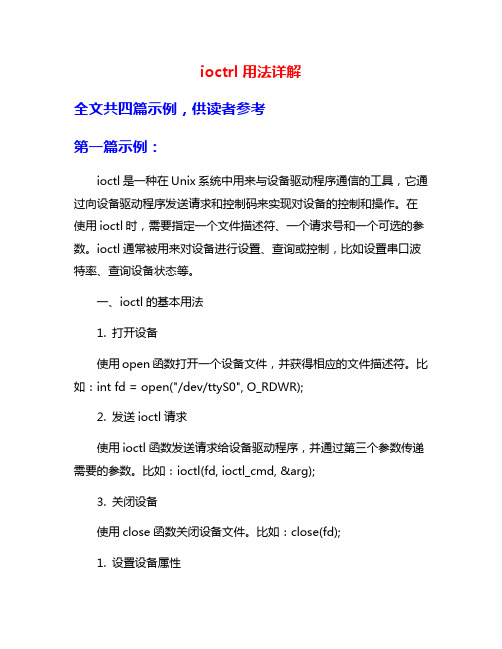
ioctrl用法详解全文共四篇示例,供读者参考第一篇示例:ioctl是一种在Unix系统中用来与设备驱动程序通信的工具,它通过向设备驱动程序发送请求和控制码来实现对设备的控制和操作。
在使用ioctl时,需要指定一个文件描述符、一个请求号和一个可选的参数。
ioctl通常被用来对设备进行设置、查询或控制,比如设置串口波特率、查询设备状态等。
一、ioctl的基本用法1. 打开设备使用open函数打开一个设备文件,并获得相应的文件描述符。
比如:int fd = open("/dev/ttyS0", O_RDWR);2. 发送ioctl请求使用ioctl函数发送请求给设备驱动程序,并通过第三个参数传递需要的参数。
比如:ioctl(fd, ioctl_cmd, &arg);3. 关闭设备使用close函数关闭设备文件。
比如:close(fd);1. 设置设备属性ioctl可用来设置设备的属性,比如设置串口的波特率、数据位、校验位等。
在Linux系统中,通过串口设备的文件描述符和TCSANOW参数可以设置串口属性。
比如:ioctl(fd, TCSETATTR,&tio);3. 控制设备操作ioctl还可以用来控制设备的操作,比如发送特定的命令给设备以执行相应的操作。
比如:ioctl(fd, CMD_X, &arg);4. 用户自定义功能ioctl还可以被用来实现用户自定义的功能,比如在设备驱动程序中定义新的ioctl命令以实现特定的功能。
用户可以定义自己的ioctl命令,并在设备驱动程序中实现相应的功能。
三、ioctl的参数说明ioctl函数的第一个参数是指向打开设备的文件描述符,第二个参数是指定ioctl操作的命令码,第三个参数是一个可选的指针,用来传递需要的参数。
ioctl命令码通常是一个32位的无符号整数,一般定义在头文件中。
ioctl命令码由四部分组成:magic number、command number、direction和size。
SJA1000的驱动程序_嵌入式Linux开发教程_[共10页]
![SJA1000的驱动程序_嵌入式Linux开发教程_[共10页]](https://img.taocdn.com/s3/m/9b33629b2e3f5727a5e962d9.png)
#include <asm/hardware.h>/*包括了所有寄存器地址映射方式*/
#include <asm/arch/cpu_s3c2440.h> #include <linux/interrupt.h> #include "candriver.h" #define FAIL 0 #define SUCCESS 1
/*文件:program_13_1.c
*/
/*简介:SJA1000 驱动程序 Nhomakorabea*/
/**********************************************************************************/ #include <linux/kernel.h> #include <linux/module.h> #include <linux/init.h> #include <linux/fs.h> #include <asm/io.h> #include <asm/uaccess.h> #include <linux/ioport.h> #include <linux/poll.h> #include <linux/delay.h>
/*首先初始化缓冲的结束值为 0*/
256
第 13 章 各类驱动设计和引导程序
接收缓冲是否为空的判断,用来检查接收缓存里面的内容。前面已经说过,将开始和结束变
量都赋值为 0 就是代表给接收缓冲清空。所以这里只要判断这两个变量是否相等就能知道接收缓
冲是否为空。当然,开始变量一般都为 0,只有结束变量才会随着接收数据的变化而产生变化。
- 1、下载文档前请自行甄别文档内容的完整性,平台不提供额外的编辑、内容补充、找答案等附加服务。
- 2、"仅部分预览"的文档,不可在线预览部分如存在完整性等问题,可反馈申请退款(可完整预览的文档不适用该条件!)。
- 3、如文档侵犯您的权益,请联系客服反馈,我们会尽快为您处理(人工客服工作时间:9:00-18:30)。
Linux设备驱动程序设计实例2007-03-03 23:09Linux系统中,设备驱动程序是操作系统内核的重要组成部分,在与硬件设备之间建立了标准的抽象接口。
通过这个接口,用户可以像处理普通文件一样,对硬件设备进行打开(open)、关闭(close)、读写(read/write)等操作。
通过分析和设计设备驱动程序,可以深入理解Linux系统和进行系统开发。
本文通过一个简单的例子来说明设备驱动程序的设计。
1、程序清单//MyDev.c 2000年2月7日编写#ifndef __KERNEL__#define __KERNEL__//按内核模块编译#endif#ifndef MODULE#define MODULE//设备驱动程序模块编译#endif#define DEVICE_NAME "MyDev"#define OPENSPK 1#define CLOSESPK 2//必要的头文件#include <linux/module.h>//同kernel.h,最基本的内核模块头文件#include <linux/kernel.h>//同module.h,最基本的内核模块头文件#include <linux/sched.h>//这里包含了进行正确性检查的宏#include <linux/fs.h> //文件系统所必需的头文件#include <asm/uaccess.h>//这里包含了内核空间与用户空间进行数据交换时的函数宏#include <asm/io.h>//I/O访问int my_major=0; //主设备号static int Device_Open=0;static char Message[]="This is from device driver";char *Message_Ptr;int my_open(struct inode *inode, struct file *file){//每当应用程序用open打开设备时,此函数被调用printk ("\ndevice_open(%p,%p)\n", inode, file);if (Device_Open)return -EBUSY;//同时只能由一个应用程序打开Device_Open++;MOD_INC_USE_COUNT;//设备打开期间禁止卸载return 0;}static void my_release(struct inode *inode, struct file *file){//每当应用程序用close关闭设备时,此函数被调用printk ("\ndevice_release(%p,%p)\n", inode, file);Device_Open --;MOD_DEC_USE_COUNT;//引用计数减1}ssize_t my_read (struct file *f,char *buf,int size,loff_t off){//每当应用程序用read访问设备时,此函数被调用int bytes_read=0;#ifdef DEBUGprintk("\nmy_read is called. User buffer is %p,size is %d\n",buf,size);#endifif (verify_area(VERIFY_WRITE,buf,size)==-EFAULT)return -EFAULT;Message_Ptr=Message;while(size && *Message_Ptr){if(put_user(*(Message_Ptr++),buf++))//写数据到用户空间return -EINVAL;size --;bytes_read++;}return bytes_read;}ssize_t my_write (struct file *f,const char *buf, int size,loff_t off){//每当应用程序用write访问设备时,此函数被调用int i;unsigned char uc;#ifdef DEBUGprintk("\nmy_write is called. User buffer is %p,size is %d\n",buf,size);#endifif (verify_area(VERIFY_WRITE,buf,size)==-EFAULT)return -EFAULT;printk("\nData below is from user program:\n");for (i=0;i<size;i++)if(!get_user(uc,buf++)) //从用户空间读数据printk("%02x ",uc);return size;}int my_ioctl(struct inode *inod,struct file *f,unsigned int arg1,unsigned int arg2){//每当应用程序用ioctl访问设备时,此函数被调用#ifdef DEBUGprintk("\nmy_ioctl is called. Parameter is %p,size is %d\n",arg1);#endifswitch (arg1){case OPENSPK:printk("\nNow,open PC's speaker.\n");outb(inb(0x61)|3,0x61); //打开计算机的扬声器break;case CLOSESPK:printk("\nNow,close PC's speaker.");outb(inb(0x61)&0xfc,0x61);//关闭计算机的扬声器break;}}struct file_operations my_fops = {NULL,/* lseek */my_read,my_write,NULL,NULL,my_ioctl,NULL,my_open,my_release,/* nothing more, fill with NULLs */};int init_module(void){//每当装配设备驱动程序时,系统自动调用此函数int result;result = register_chrdev(my_major,DEVICE_NAME,&my_fops);if (result < 0) return result;if (my_major == 0)my_major = result;printk("\nRegister Ok. major-number=%d\n",result);return 0;}void cleanup_module(void){//每当卸载设备驱动程序时,系统自动调用此函数printk("\nunload\n");unregister_chrdev(my_major, DEVICE_NAME);}2、设备驱动程序设计Linux设备分为字符设备、块设备和网络设备。
字符设备是不需要缓冲而直接读写的设备,如串口、键盘、鼠标等,本例就是字符设备驱动程序;块设备的访问通常需要缓冲来支持,以数据块为单位来读写,如磁盘设备等;网络设备是通过套接字来访问的特殊设备。
1) 设备驱动程序和内核与应用程序的接口无论哪种类型的设备,Linux都是通过在内核中维护特殊的设备控制块来与设备驱动程序接口的。
在字符设备和块设备的控制块中,有一个重要的数据结构file_operations,该结构中包含了驱动程序提供给应用程序访问硬件设备的各种方法,其定义如下(参见fs.h):struct file_operations {loff_t (*llseek) (struct file *, loff_t, int);//响应应用程序中lseek调用的函数指针ssize_t (*read) (struct file *, char *, size_t, loff_t *);//响应应用程序中read调用的函数指针ssize_t (*write) (struct file *, const char *, size_t, loff_t *);//响应应用程序中write调用的函数指针int (*readdir) (struct file *, void *, filldir_t); //响应应用程序中readdir调用的函数指针unsigned int (*poll) (struct file *, struct poll_table_struct *);//响应应用程序中select调用的函数指针int (*ioctl) (struct inode *, struct file *, unsigned int, unsignedlong);//响应应用程序中ioctl调用的函数指针int (*mmap) (struct file *, struct vm_area_struct *);//响应应用程序中mmap调用的函数指针int (*open) (struct inode *, struct file *);//响应应用程序中open调用的函数指针int (*flush) (struct file *);int (*release) (struct inode *, struct file *);//响应应用程序中close调用的函数指针int (*fsync) (struct file *, struct dentry *);int (*fasync) (int, struct file *, int);int (*check_media_change) (kdev_t dev);int (*revalidate) (kdev_t dev);int (*lock) (struct file *, int, struct file_lock *);};多数情况下,只需为上面结构中的少数方法编写服务函数,其他均设为NULL即可。
每一个可装配的设备驱动程序都必须有init_module和cleanup_module两个函数,装载和卸载设备时内核自动调用这两个函数。
